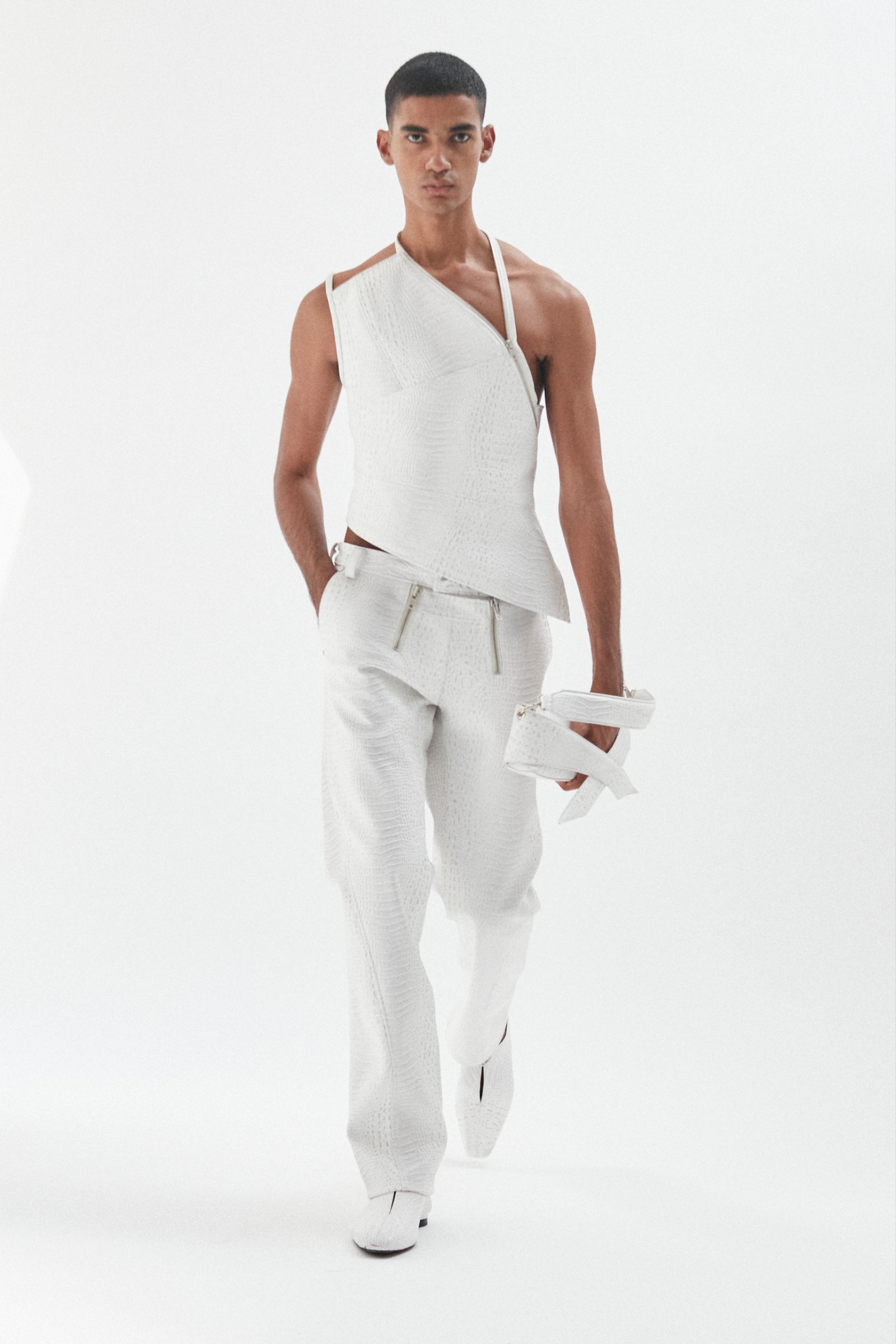
GmbH
Wednesday evening marked the beginning of Eid-Al-Adha, the three-day Islamic festival of sacrifice, and one of the holiest periods of the religion’s calendar. Wednesday also marked the release of GmbH’s SS24 collection, Kurban, the name of which chimes with the festival’s Turkish name, Kurban Bayramı. Rather than a body of work tied to the holiday itself, what Benjamin Huseby and Serhat Işık offered was a rumination on the notion at its heart – sacrifice, as the title directly translates to – and its implicit spiritual connotations.
As the first collection they’ve presented since their ongoing, acrimonious split from Trussardi, the Italian house they were appointed as creative directors of in 2021, became public knowledge, it also represented a gesture of renewed devotion to the brand the pair built. "This season, it was about the feeling of having sacrificed a lot to pull this collection together, and redirecting our focus on GmbH after going through some turbulent months," Serhat shared. “We've just been navigating how to come out of two years that have been very intense, and rediscovering our joy of working for GmbH again,” Benjamin echoed. “When we started GmbH, it was really about making a wardrobe for us and our friends, and I think this collection is, in many ways, us trying to go back to that, making new, wearable clothes that we want.”
Granted that’s not to say that they’ve dulled the elevated, couture-inflected timbre that has defined their work in recent seasons, as elegant-shouldered wool blazers and coats with doming, navel-baring front cut-outs – an elevated riff on the sustained grip that y2k-era starlet styling continues to exert on fashion – as well as mono-shouldered tops that read like flirty riffs on sari draping. The collection’s signature drapes – flowing gauzy gathers that swoop down from the neck – subtly nod to capes worn to religious rites such as circumcision ceremonies and sacrifices, while calligraphic inscriptions on gradient-dyed shirting and softened riffs on the brand’s signature workwear-inflected aesthetic imply both spiritual and physical protection.
That this is a collection that broaches themes that may be unfamiliar, and even uncomfortable, to a eurocentric fashion audience is a fact that both Benjamin and Serhat are fully conscious of. This dedication to giving space to customs, traditions and identities that have been overlooked by — or intentionally omitted from — conventional fashion narratives is, however, a testament to their enduring adherence to the values on which they’ve built their brand. “Very early on, when we started thinking about ceremonies and sacrifices, we realised that talking about these things in a eurocentric context feels a bit weird, or even frowned upon,” Serhat says. “Though it might sound crazy to some, they're things that we find beauty in, and that we want to keep exploring. This is the beginning of a journey to visualise and verbalise these notions” — and a journey we can’t wait to watch play out.
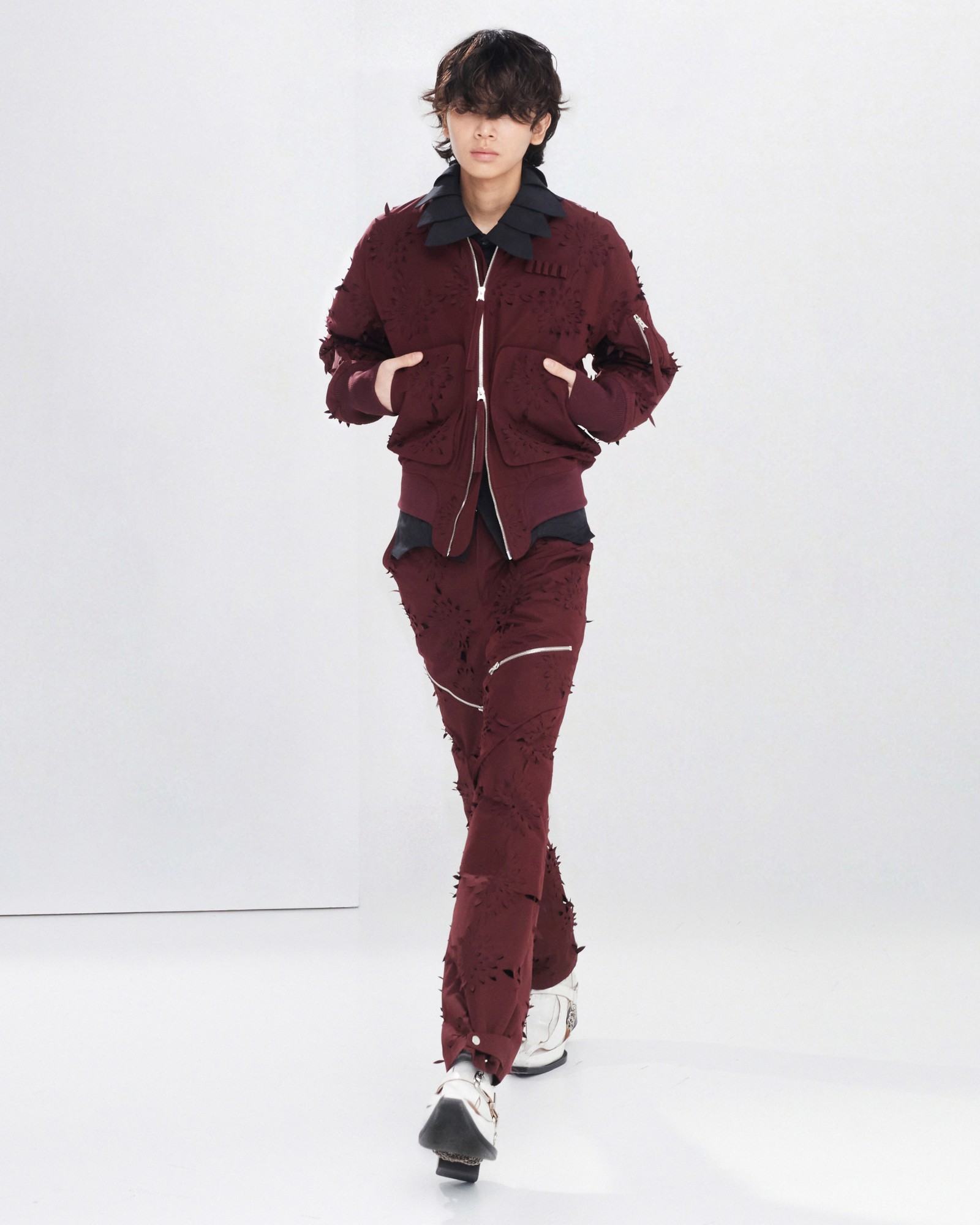
Juntae Kim
“Rest in perfect peace Dame”, ends the collection notes for LVMH prize 2023 finalist Juntae Kim’s SS24 offering. As a designer who is constantly “unravelling binary constrictions” across gender, sexuality, class and race with his London and Seoul-based gender-fluid brand, the late Vivienne Westwood was of course a major influence and his latest offering is an homage to one of her most iconic runways. Entitled Slashes and Holes – a play on the inspiration: Viv’s SS91 collection Cut and Slash – streetwear garments are torn apart and then re-sewn together, hems raw and distressed in a nod to punk that makes the garments look hairy, and then punctured with East Asian botanical cut outs. Cargo jeans and matching denim blazers feature acid wash lightening at the waist and thighs along with ribbed corset detailing in unexpected points such as the crotch, the shoulders or the elbows. Simple shirts feature petal cut collars and hems while the same detailing wraps around shorts legs and bomber jackets have drawstrings that pull the body in, or loosen it up, at the waist. Like Viv did for all those years with punk, this was a collection subverting the notions of what, and who, is beautiful.
Romain Kremer
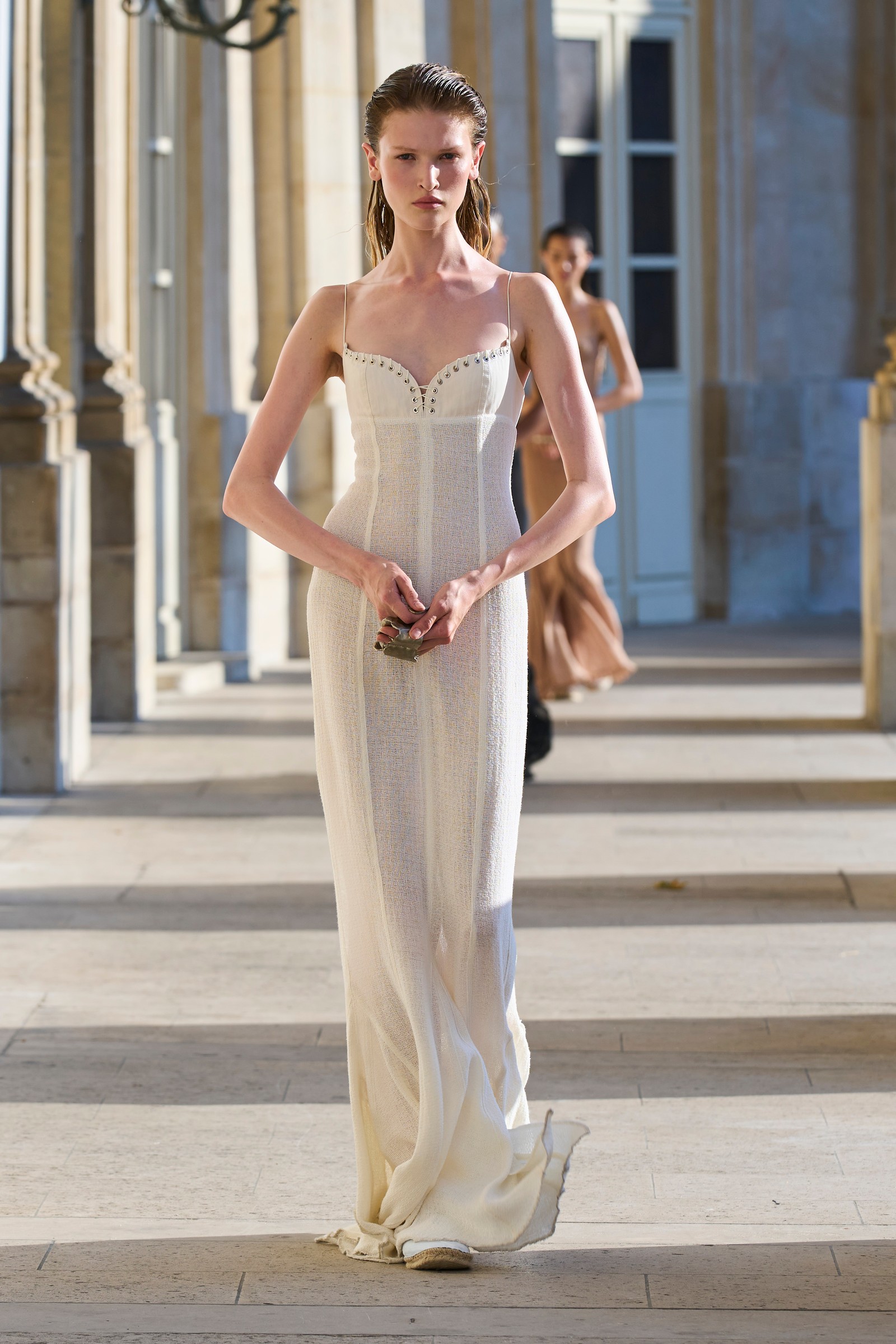
Ludovic de Saint Sernin
Following the sudden departure of Ludovic de Saint Sernin from the helm of Ann Demeulester, mere months after presenting his debut collection for the cult Belgian brand, all eyes were on his namesake label’s show, which, yesterday, closed out Paris Fashion Week Men’s. Among those who turned out to see what many anticipated would be a statement of ‘revenge’ was a bevy of industry big-wigs from Rick Owens and Olivier Rousteing to Daniel Roseberry and Carine Roitfeld, the presence of each amounting to a significant declaration of support.
Rather than lean into expectations to deliver a clapback collection, though, Ludovic instead decided to adamantly remind his audiences of his fundamental values as a designer; the ethos of poetic elegance, unabashed sensuality and queer advocacy that formed the foundations of the house since he founded six years ago. Set in the stately courtyard of the Musée des Archives in the Marais, it opened with a suite of mermaid gowns and skirts in gossamer Japanese tweeds, conjuring a sense of fresh, summery romance. Open front button-down shirts and wide, puddling trousers in the same artisanal fabrics cleverly carried this sensibility over onto the menswear front, with a key throughline between the two being the subtly restrictive, hand-clasping white brass pieces created in collaboration with New York-based jewellery label Vagujhelyi, each a refined reminder of the implicit erotic charge of the act of restraint.
Elsewhere, the brand’s accessories offering was built out through new patent and crossbody iterations of the Cleavage bag, its signature eyelet trimmed baguettes, while the indulgent shimmer and sparkle that’s now an LdSS hallmark came through in a suite of Swarovski crystal mesh sash tops, tote bags and full-length net-skirted gowns, each hand-crafted by Ludovic himself. All in all, it was a collection that confidently affirmed that, despite the storm clouds that have swirled overhead, the house of Ludovic de Saint Sernin still stands strong.
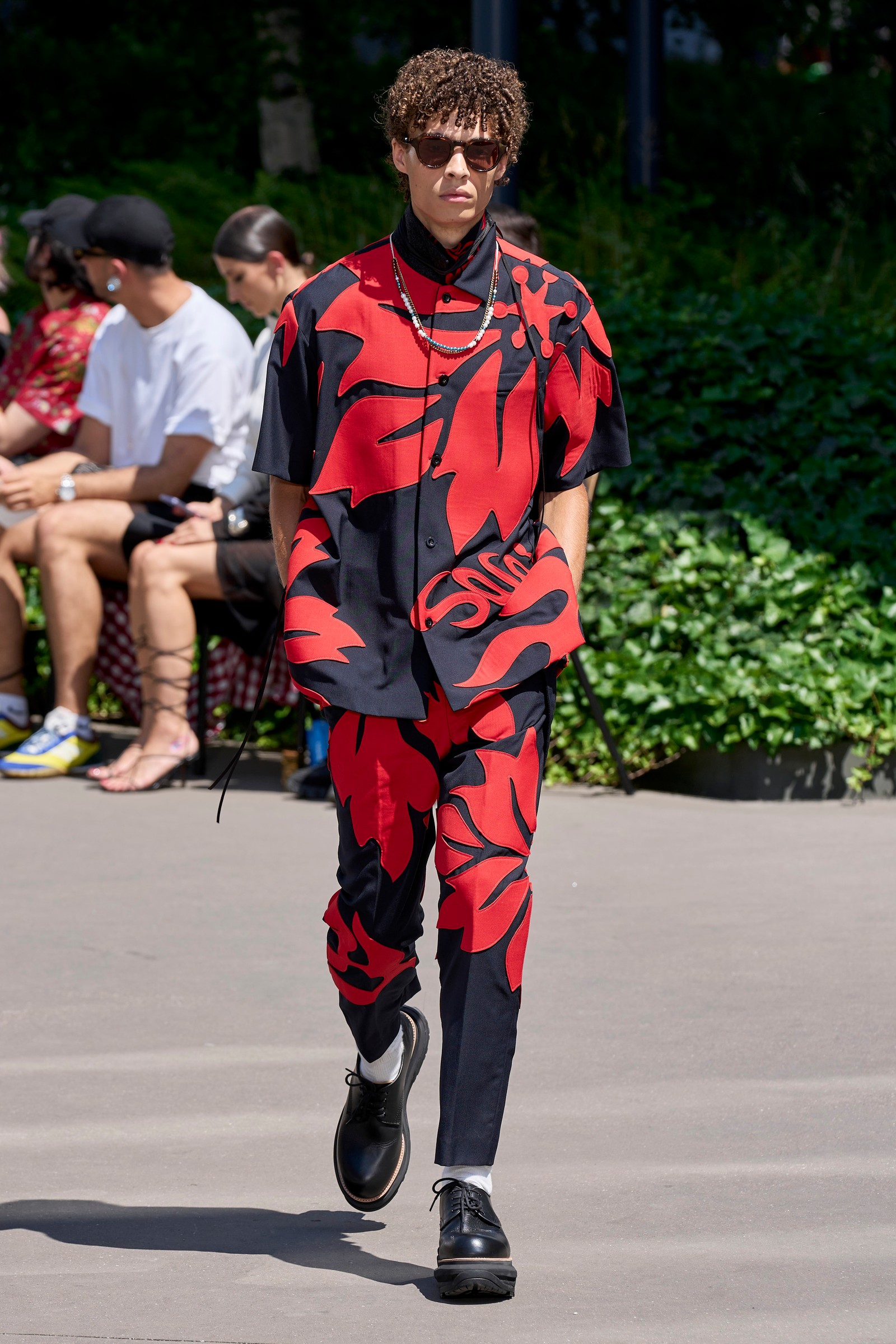
Sacai
Across recent seasons, uniforms and uniformity has been playing on the hive mind of fashion designers – reimagining, usurping and rebelling within the strictures of stylistic guidelines, often in response to a world that feels increasingly restrictive. It’s been on the brain of Chitose Abe, founder and designer of Japanese brand Sacai too, and for SS24, she brought her unique and wonderfully-absurdist splicing of materials to workwear and suiting. With a more positive, hopeful lens, though – inspired by the creative spirit of the underground punk movement in the 70s, a time when society also felt like it was rapidly changing – the definition of “uniform” was explored through hybridised, patchwork tailoring mirrored within both the tops and bottoms of each look.
Oversized denim jackets were bonded to double-breasted pinstripe blazers over matching mini-skirts that look like thrifted, baggy suit trousers turned upside down. Hawaiian florals – the uniform of any dad on a sunny holiday – was cut out and sewn onto shirting and knitwear alongside moleskins born from French workwear of the 40s, or paired across multiple looks with elements of a traditional tweed two-piece. Speaking of workwear, the label’s ongoing collaboration with Carhartt WIP made an appearance in the form of classic jackets from the latter intertwined to form a series of two-tone streetwear ensembles, or cut as a bib extending from an elegant pleated dress. The pleating Sacai has become beloved for also followed through in sleeveless trench coats and baggy knits, and crop tops, skirts and peplums made from suit fabrics, thus narrowing silhouettes and forcing these excesses of thick materials closer to the body.
“A collection soft and sweet as a summer breeze, stirred by a tender strength,” is how Hermès poetically described its latest menswear collection, designed by fashion’s longest-serving creative director Véronique Nichanian. This year, she will celebrate 35 years at the world’s most iconic luxury house, and her tenure is due in part to her tireless reinvention of classic menswear, and her ability to infuse it with youthful ease and lightness so that even the simplest of suits is never boring. Instead, as her SS24 collection showed, it can be breezy, cut from technical parchment-like fabric as light as chiffon, worn with an open shirt over a gossamer silk vest, and chunky fisherman sandals. Or, it can be broken up, paired with reversible parasol-striped silk blousons, or lattice mesh shirts akin to grown-up string vests. The possibilities are endless chez Hermès: this is a house that doesn’t just make beautiful men’s clothes but shows men how to wear them.
For the last few seasons, Jonathan Anderson has been meticulously scaling back his Loewe shows in what he has been calling “a reductionist act”, a continuation of his deep dive into contemporary surrealism as a means to answering some of fashion’s big questions: What is the purpose of a fashion show? How are clothes viewed online, as opposed to in person? How does craft, a pillar of Loewe, evolve in a time of digital imagery?
For his SS24 menswear collection, it came down to a play on perspective. Three Lynda Benglis fountains — some towering up to the ceiling, others as low as a garden water feature — formed a splashy backdrop to a collection that he said he made with the “idea of a fisheye lens looking up at someone”. The result was a pervasively wasp-waisted silhouette with a shrunken torso and elongated legs, extending from the ribs down to the floor. The first few looks also riffed on those fountains: polo tops and jeans entirely emblazoned in water-drop crystals, colour-matched with the fabric beneath. “I think the sparkle gives you this idea of illusion when you see it on screen or in the flesh,” Jonathan said. Dwarfed by the fountains in the background, they shimmered in the midday light pouring through the glass ceiling of the venue, offering a slightly jazzier counterpart to the ‘Is it Leather?’ variations of wardrobe staples that have appeared in other collections this year.
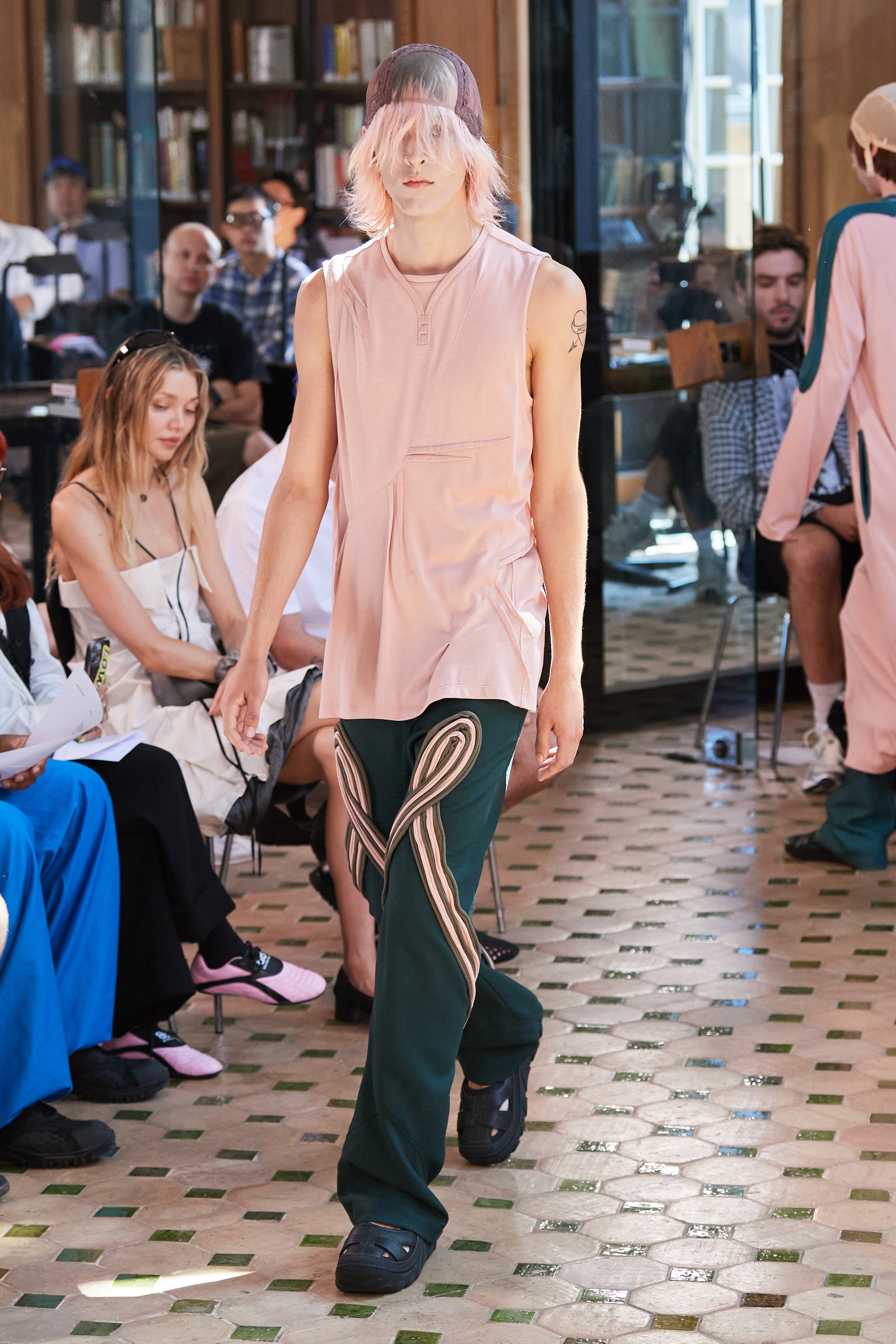
Kiko Kostadinov
“All the world’s a stage,” begins the melancholy Jacques’ canonised monologue from William Shakespeare’s As You Like It, “And all the men and women merely Players.” Whether Kiko Kostadinov leafed through Elizabethan comedy remains unknown, but the sentiment expressed in it certainly chimes with his pondering of “art as a stage, life as a stage,” as the show notes for his namesake brand’s SS24 menswear collection.
An exploration of the everyday act of stepping into character through dress – tinged by influences spanning the work of American conceptual artist Tom Burr, and Pier Paolo Pasolini’s 1962 short film, La Ricotta – this season saw Kiko grapple with “the meta-fictional conceits of film and fashion”, elevating familiar garment archetypes through subtly innovative cuts and embellishments with a sense of occasion – or of distinct character, if you will. An asymmetrically fastened, black tailored jacket, for example, came with bulging epaulettes and a quietly camp, frilled gazar collar, while plain drill trousers came from Bulgarian star motifs and rolled jersey appliqués at the knees. Jumpsuits came in loose, languid jerseys or in sharply tailored, waist-skimming wools, knit cardigans in bands of cream and cobalt, olive and pink, had Möbius-strip-like upper fastenings, and an otherwise fitted sage jumper was playfully off-set by its floppy white cowl neck.
Indeed, off-kilter tweaks to otherwise familiar clothes are nothing new in the world of Kiko Kostadinov, but here, there was a sense of theatrical wit to the offer; a subtle playfulness that cut through the dense contemplations that served as the genesis point of the collection. Rather than a moody meditation on the notion of “life as a stage”, this was a body of work that embraced and celebrated the possibilities that come with living in a world you can script and style as you go.
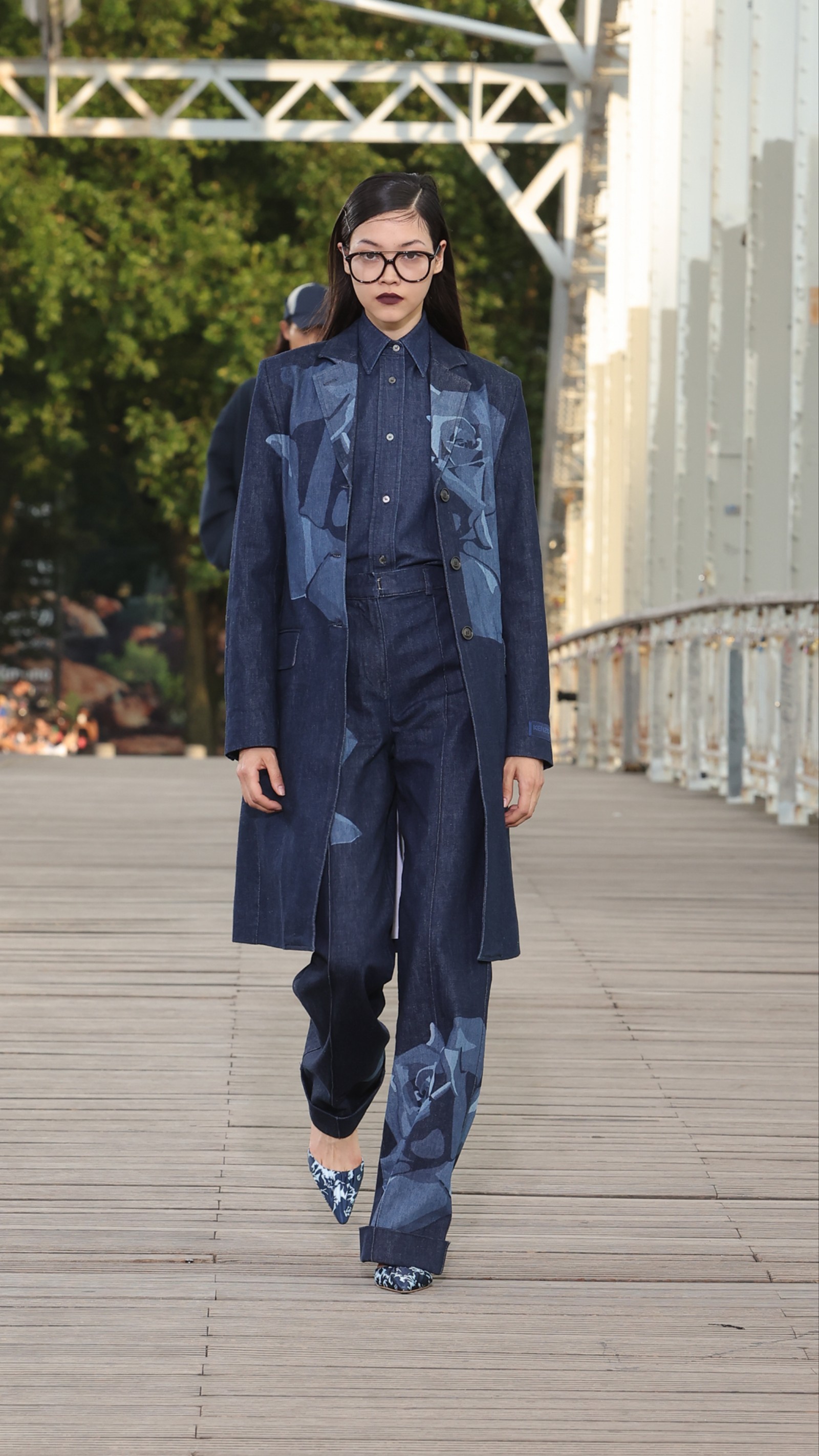
Given that his best mate Pharrell kicked off the week by shutting down a bridge in central Paris for an all-singing, all-dancing start to his tenure at Louis Vuitton, it felt fitting that Nigo should follow suit for his latest presentation for LVMH stablemate Kenzo. Granted, this wasn’t quite on the same scale as the LV extravaganza, which will forever be remembered as a watershed moment in fashion’s metamorphosis into a form of arena-level entertainment, but, set on the footbridge that connects the Palais de Tokyo to the Eiffel Tower, it nonetheless made for a picture-perfect, almost cheesily romantic Paris Fashion Week moment.
The collection that filed along the Passerelle Debilly was imbued with an echoing spirit of romantic kitsch, an ode to City Pop — the fusion of pop, funk and boogie that defined the sound of Nigo’s adolescence in Japan in the 80s. Rather than overly literal nods, the legendary designer set about interpreting the optimistic affect of the genre through poppy graphic transfers, all-over logo-prints, tailoring in billowing proportions, warm pops of pink and muted blues, while characteristically Japanese garments were subjected to a process of sartorial code-switching. Judo jackets were reimagined as workers’ chore jackets, while seigaha — ancient wave motifs — were recreated on indigo denims, sitting alongside swashed interpretations of the Kenzo logo by Verdy, the Japanese graphic artist and longtime contemporary of Nigo.
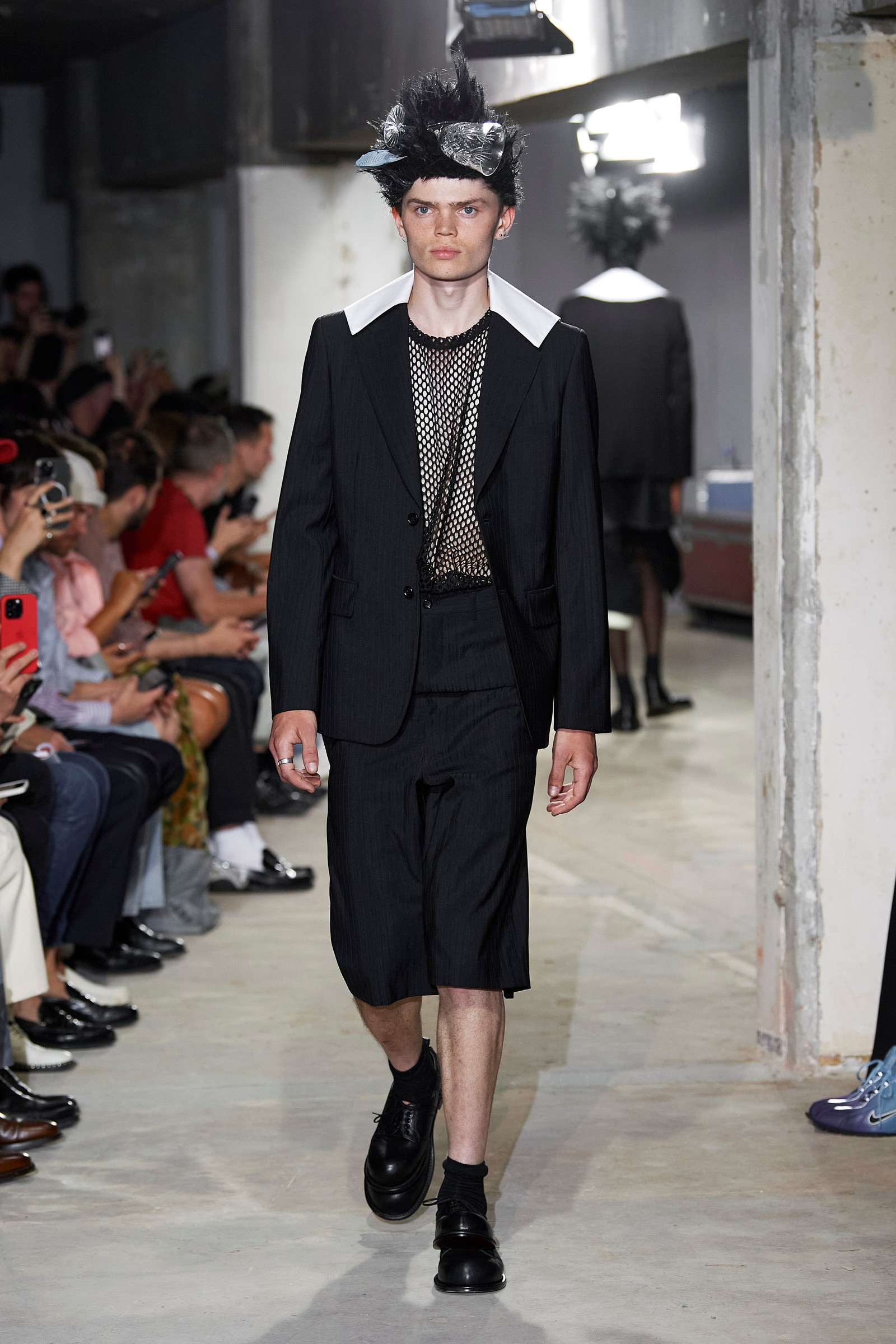
Comme des Garçons Homme Plus
For a collection titled “BEYOND REALITY”, the foundation of Rei Kawakubo’s latest offering for her Comme des Garçons Homme Plus runway line was, perhaps surprisingly, quite prosaic. Indeed, rather than the conceptual-weighty esoterica — ciphers for the designer’s knotty musings and meditations articulated in cloth — that we so often expect from the Japanese avant-gardist, the collections opening gambit comprised a suite of smart, white-collared tailored black coats of varying length, sported over bermuda shorts, mesh tunics and polished derby shoes.
Peek beyond the sober pretences set forth by these looks, though, and the bizarro flair that acolytes of the brand flock to it for made themselves strongly felt. Those oxfords, for example, were doubled up, crafted as if for a future human species that had evolved to have one foot cleaving out from the side or top of another, while the hems of shorts were constructed from inverted waistbands. “In order to find a new world we have to go beyond reality,” Rei wrote in her mono-line show notes, a pithy indicator of her intention to scope out new possibilities beyond the tangible and familiar, while using — and manipulating — the tangible and familiar to do just that.
This intention was further articulated by spliced wool blazers and morning coats that trailed with scrims of hair extensions; skirts that fastened with jacket plackets that erupted into a mass of feather-like cut-outs; slim jackets with jutting, sawn-off shoulder panels; and intentionally disproportionate silhouettes in all-over glossy tropical foliage motifs. It was in the closing looks that the collection’s titular theme was interpreted most literally, though, with a series of trompe l’œil prints of striped shirts and historical military garments — alongside frescoes of stately living rooms and opulent curtain-fringed theatre stages — decorating double-breasted jackets, tailored t-shirts and wide-weave sweaters; all gesturing at the endless possibilities that lie beyond the first degrees of reality that first meet the eye.
“Dior is all about the clothes, at the heart of it is silhouette, shape, technique and fabrication of the very highest order,” Kim explained, clearly keen to avoid any distractions. “I like to think that in my five years of being here, I have not forgotten this.” Indeed, Dior’s menswear has boomed since his arrival, and his influence has been felt in the collections of so many designers: the streetwear and blue-chip artist collabs, the languid-yet-hourglass tailoring, the typically feminine motifs, the luxed-up sportswear, and the constant investigation of the archive to create a menswear wardrobe that rivals any womenswear counterparts. His winning formula has become ubiquitous across the industry, both in womenswear and menswear. Even this week, you can trace the diaphanous trousers, jaunty tailoring, floral brooches and charm-like accessories seen across many menswear collections back to Kim’s studio, which is now responsible for producing more than a dozen collections a year for both Dior Men and Fendi womenswear.
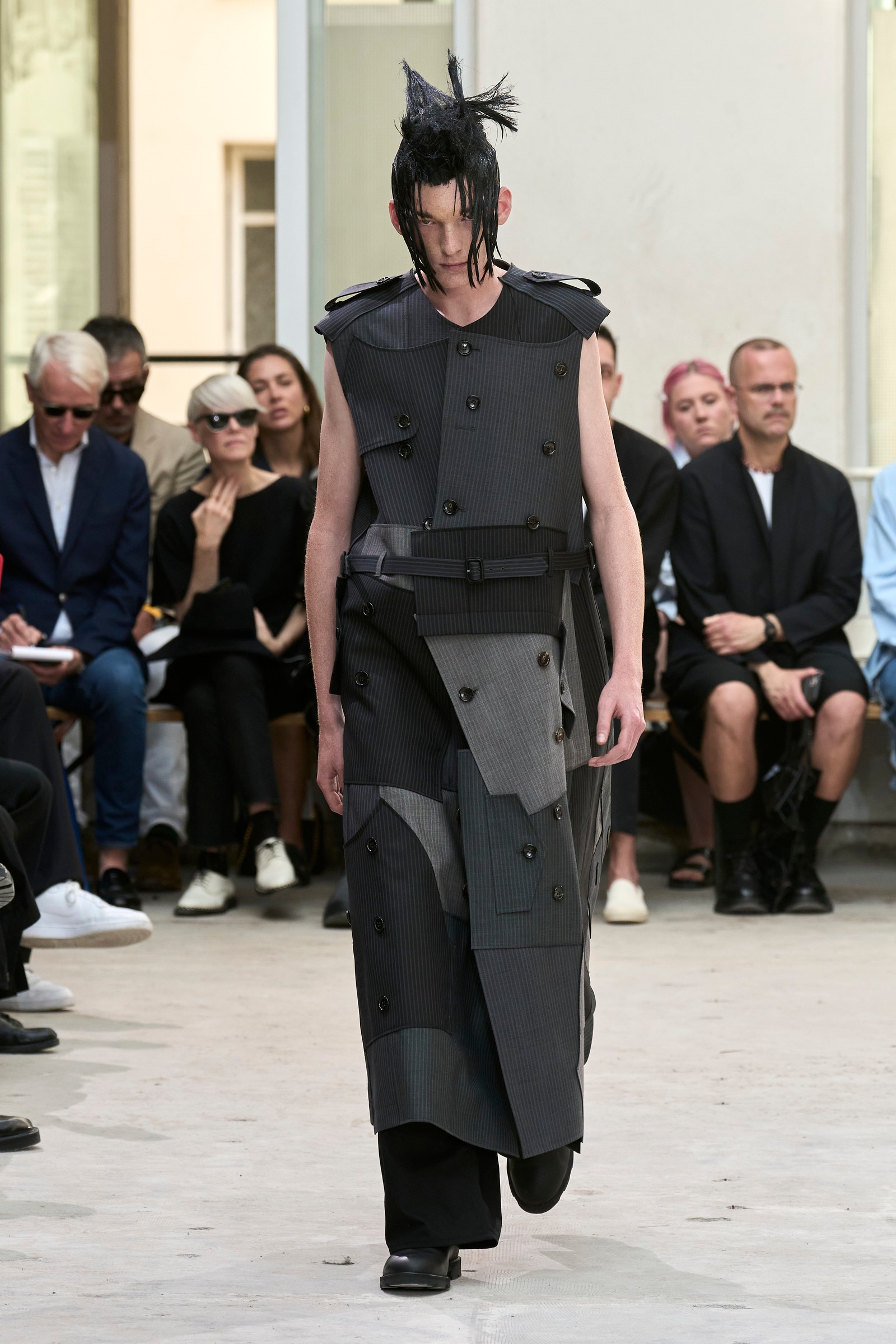
Junya Watanabe
On Friday, Junya Watanabe presented his SS24 menswear collection in a somewhat abandoned Parisian building in the 9th arrondissement, where a slew of notable editors and attendees – including Pharell Williams – braved the heat of the space’s impressive skylights to view an equally impressive collection.
Models in spiked-up punk hair marched through the space to Pink Floyd, revealing an offering anchored in collaborations – Brooks Brothers, Levi’s, Carhartt, C.P Company, Gregory, Lousy Livin, MXDVS, Palace, Stussy, Bates, Filson… the list goes on. A central element of Junya Watanabe’s menswear, this season’s amped-up collabs were seen in patched trench coat tunics and trousers, seamed denim jackets and boiler suits with more pockets than one could count, and a series of leather biker jackets that closed the show, belted across every which way, with their silver buckles clinking down the runway. The entire offering blended elements of the designer’s womenswear line, with that of MAN: “My collection is comprised of many collaborators,” the show notes read, “however this time I focused on Junya Watanabe (womenswear) as the main collaboration. The idea and the way of my approach in creation… of Junya Watanabe is completely different to MAN, so they are different brands to me. I wanted to incorporate clothes like Junya Watanabe into MAN.” The result is a retro-futuristic vision for workwear that serves as a time capsule for our current consumerist moment.
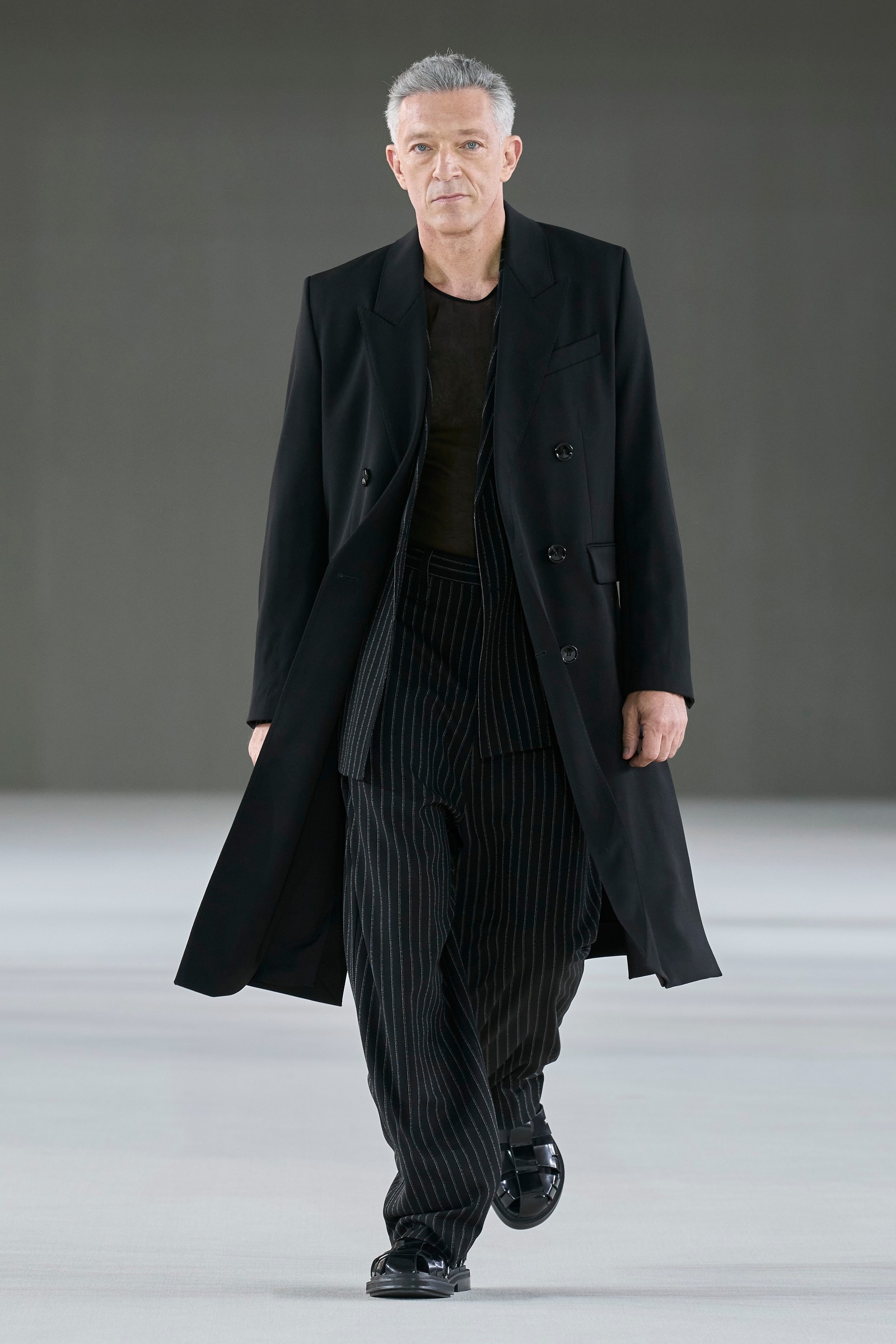
Ami has carved out a space on the Paris Fashion Week Men’s calendar as one of the biggest co-ed shows. Its latest was held at the industrially cavernous Tennis Club de Paris — the site where Phoebe Philo and Helmut Lang staged some of their most influential shows and seemed to follow in the footsteps of those designers’ low-fi, high-impact legacy. “The minimalism of the 1990’s is one of the most influential and fascinating movements in fashion, and one of my favourite ones,” said Alexandre Mattiussi, who didn’t use the words ‘Quiet Luxury’ but may as well have. “I want to simplify the superfluous, so I can concentrate exclusively on the essential — and more specifically the collection, the wardrobe,” he added. “Everything else is a distraction.”
Vincent Cassel opened the show in a simple black double-breasted overcoat, black sweater and pinstripe trousers, looking like he might just be walking down a street in Paris on a mid-week morning coffee run. What followed was some seriously chic, precision-cut clothes that could surely be worn over and over in years to come: plenty of slouchy black tailoring, charcoal knitwear, wispy chiffon blouses and dresses cut like t-shirts, apron-pleat schoolgirl skirts, and lots of logo-less accessories to match. It was a uniform comprised of some of the greatest hits of 90s minimalism, cleaned up and revamped for our eyes today (by that I mean slightly narrower, slightly crisper and slightly more luxe than the 90s anti-glam brigade, which sometimes doesn’t translate to our iPhone-sharpened eyes). Of course, there were some jolts of exuberance, from a handful of wardrobe basics smattered with sequins. That’s the thing about uniforms, as anyone wore one to school knows: sometimes you can’t wait to get out of them and into something that a bit jazzier.
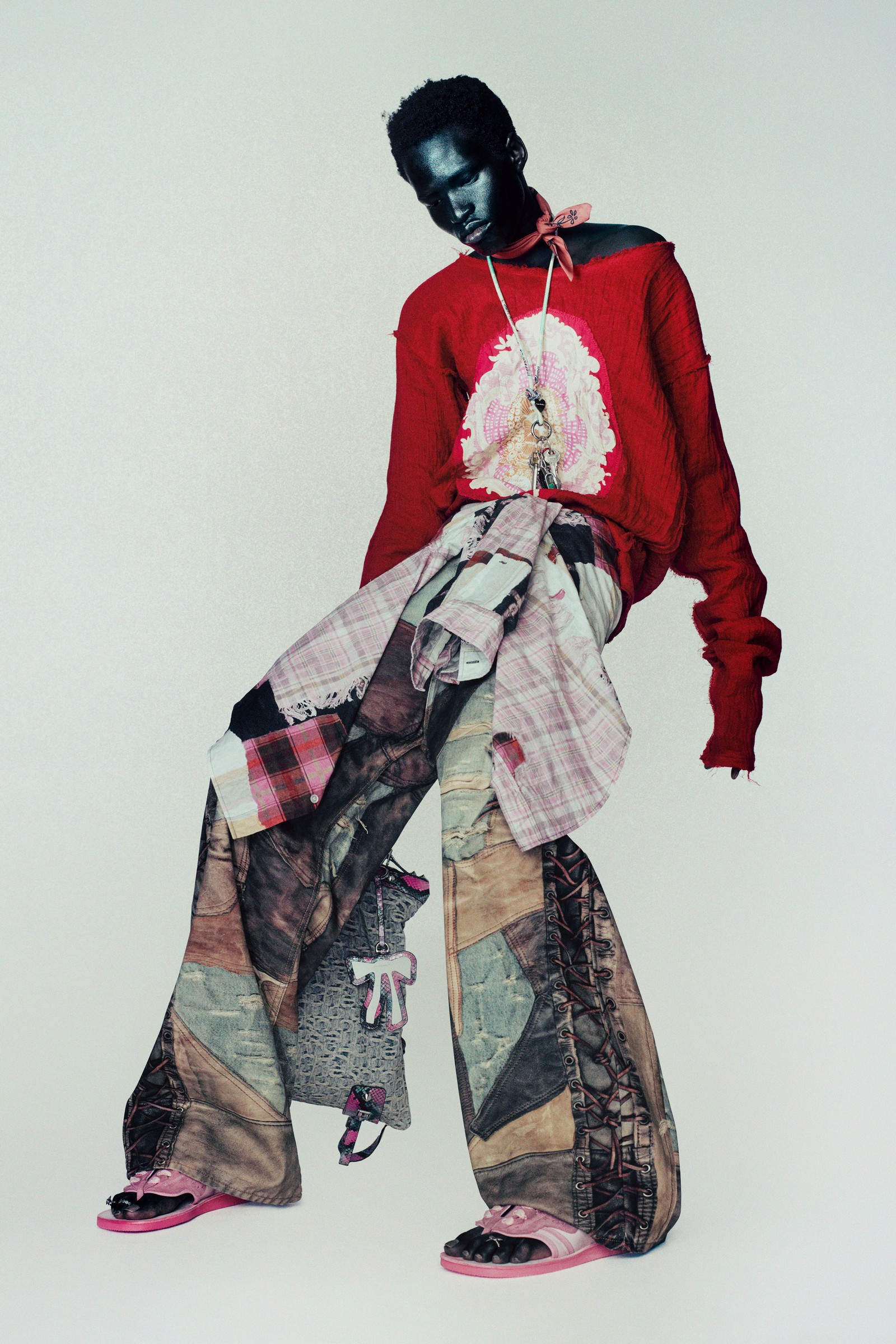
Acne Studios
There’s an undeniable sense of freedom that comes with summer, the warm air and long, golden days that stretch into nights. More freeing still, are the summer getaways, where weekends can be spent soaking up the sun on the Mediterranean, swimming in crystal blue waters. Inspired by a recent trip to Italy and the ‘Grand Tour’ voyages young men would take to explore Europe in the 17th century, Jonny Johansson, creative director of Acne Studios, presents a menswear collection that offers a vibrant, whimsical take on the modern holiday wardrobe.
“I took a trip to Venice. It reminded me that when you’re travelling, you choose to pack your really personal garments, and these get mixed up with new-found pieces, maybe historical garments, or merchandise you bought from a tourist shop,” Jonny says. “You experiment with what you have in your suitcase – you feel kind of free to change your identity, and to be more eccentric with your style.”
This sense of experimentation – of embracing an unconventional spirit – has become innate to Acne Studios, a label that, especially in recent years, has managed to translate the charmingly chaotic energy of today’s youth into their collections, season after season. Here, layered-up graphic knits are paired with metallic leather skirts, slitted up the waist, branded briefs poke out of skirted jeans, while bike shorts and skin-tight printed leggings are paired with clashing coloured tops, that channel the brightly-painted houses on the Venetian island of Burano. There’s an emphasis on denim, as well, as both a longtime anchor within the brand and a staple within the travel wardrobe. “It’s an axle for everything else, and you can wear it anywhere,” Jonny adds. “This collection is partly based on some of my favourite vintage denim pieces from my archive that I engineered to create a trompe-l’oeil effect. It’s not a defined silhouette or a clear graphic look, it’s more layered. It’s about an accumulation of things you’ve picked up along the way.” Whether on holiday or not, this, dear reader, is exactly how we want to dress.
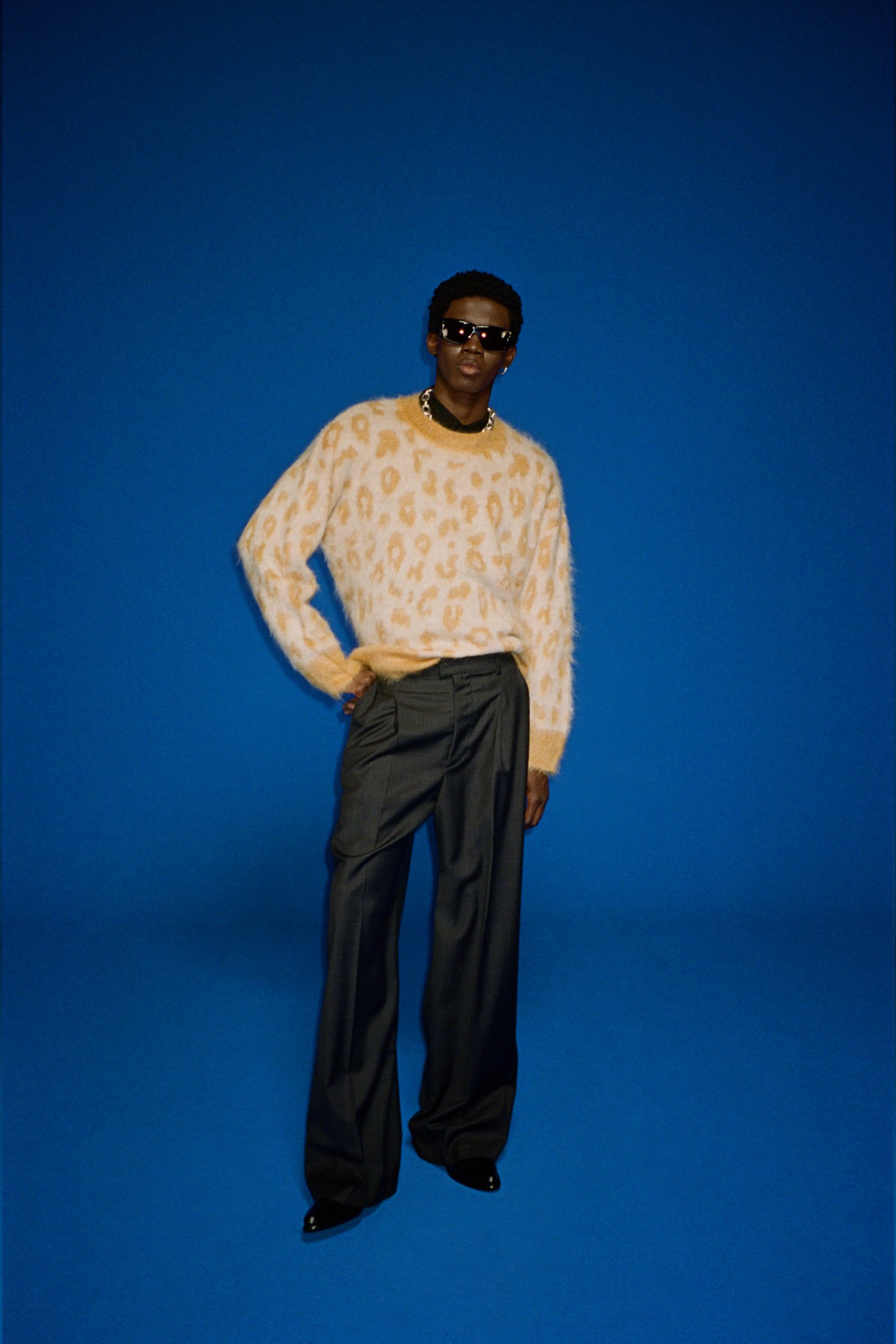
Isabel Marant
For SS24, Isabel Marant presents a menswear collection based on “a changing, urban and chicer silhouette… inspired by the world of tailoring as it blends with sportswear and workwear codes to shape a hybrid allure.” For the Parisian label, who debuted the offering on Instagram against a bright blue backdrop, affording this season’s light palette of white, pale pink, yellow and pixelated prints a pop, this new edge comes in outsized silhouettes. Extra wide-legged trousers and denim are paired with open-knit vests, sleek shirting and fitted trenches; hoodies are layered under sharply-cut wool coats; and track pants poke out from under structured blazers. It’s easy to imagine the collection existing somewhere between uptown and downtown; Paris and New York, well made for a wearer who’s up for – and dressed for – whatever the city might throw their way. At 18 looks, the range is tightly-edited, but Isabel Marant finds joyous balance in these contrasts.
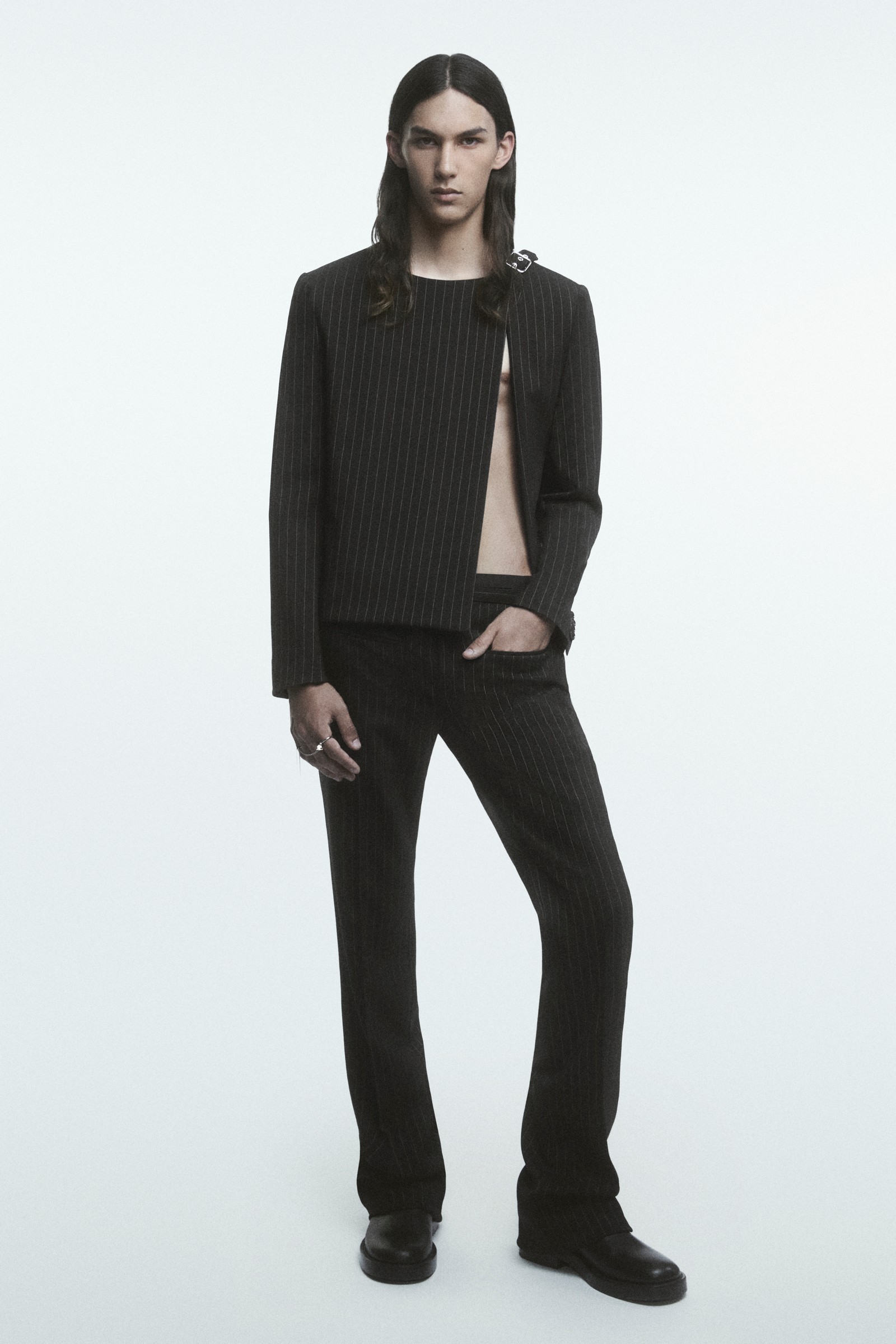
Courrèges
The pursuit of geometric simplicity in fashion often entails a rather sober end result. Throughout his time at Courrèges, however, Nicolas di Felice has time and again proven the sensuality that can come from creating clothes from the simplest of shapes, bringing a libidinal charge to a formally austere approach. His SS24 men’s and women’s pre-collection were no exception, demonstrating the Belgian designer’s honed awareness of how a single slash or a particular drape on an otherwise prosaic garment can introduce a delicious grain of subdued subversion.
A fastidiously tailored long-sleeve in pinstripe wool, for example, is slashed down the left breast to reveal a flash of chest, and attached at the shoulder with a leather buckle. A similar treatment is given to a miniskirt in the same fabric, which buttons (or unbuttons) up the left thigh to a foldover fastening at the hip. This sense of ‘undoing’ carries over into ostensible simple tank tops and trapezoid gingham vests with shoulder straps subbed out for harness-like leather straps; bralettes and minidresses composed of overlapping vinyl circles; long v-neck tunics with open, buckled-up flanks; and dresses and tanks draped from scrims of sheer, iridescent mesh – pieces you can easily imagine hot-bodied it-girls, gays and theys the world over queueing up to cop next summer.
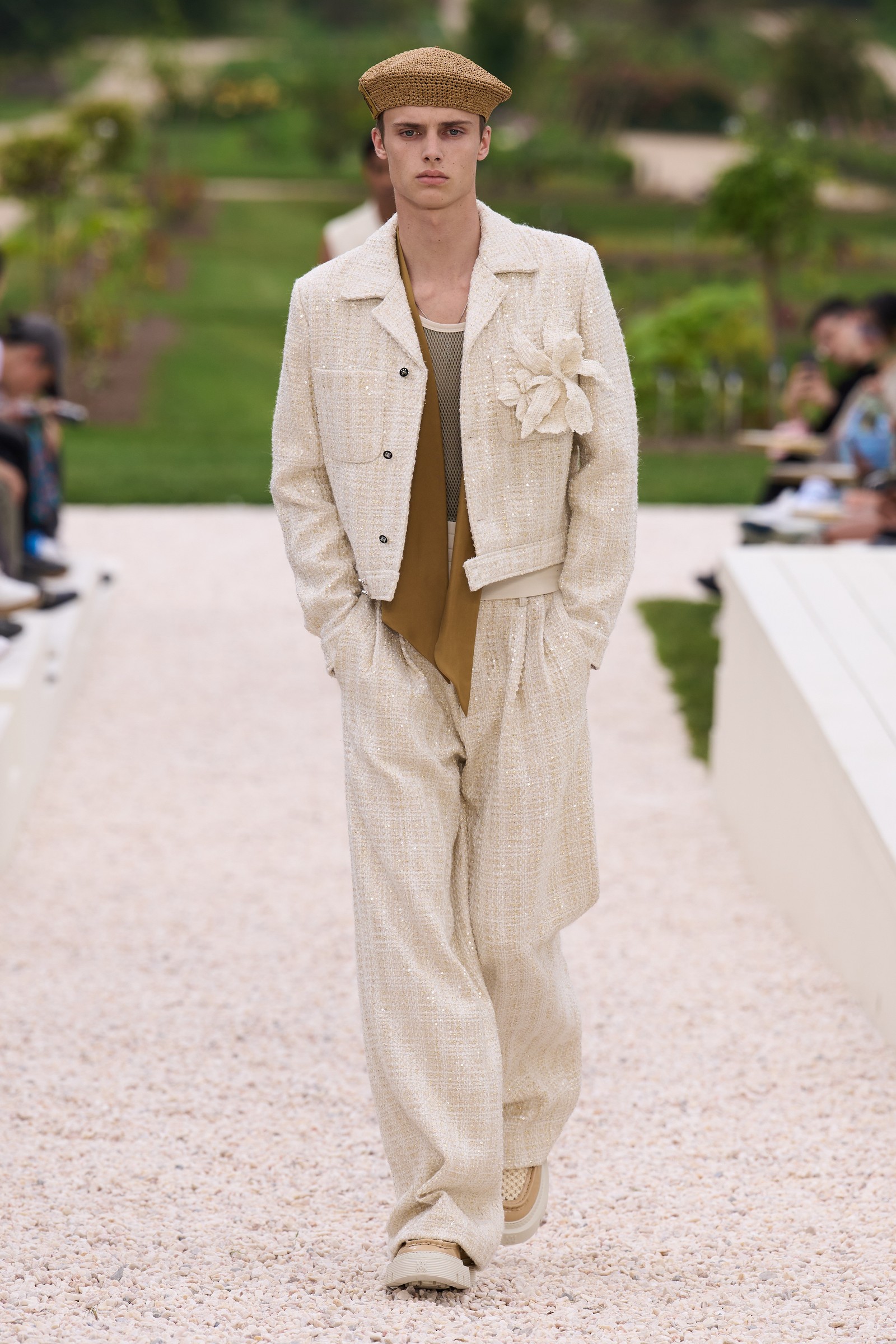
Amiri
While Mike Amiri has most often channelled the sartorial archetypes of his hometown of Los Angeles through his namesake brand, this season saw the designer take his protagonist on a jolly to the south of France. Though the distance between Southern California and the Côte d’Azur may be far, the two places are basically birds of a feather, brought together by their shared sunny climes, and the breezy, bohemian elegance that inflects the local style.
It was exactly this sensibility that oozed from the collection Amiri showed in the sun-bathed Jardin des Plantes, an offering replete with slouchy suit jackets, billowing bermuda shorts and gently puddling, wide-cut trousers in soft hues of stone greys, sky blues, ochres, and sunset pinks. Knit vests with wave patterns encrusted in Swarovski crystals and chunky crochet cardigans conveyed the sense of artisanal handcraft that has long been a pillar of the brand – a facet that made itself yet more prominent on realising that the latter pieces were in fact woven from fine leather yarns. Elsewhere, a fusion of Californian cool and Gallic joiede vivre came through in flutters of silk scarves, trousers cut from weighty, blanket-like plaids and the shimmer of sequin-strewn bouclés.
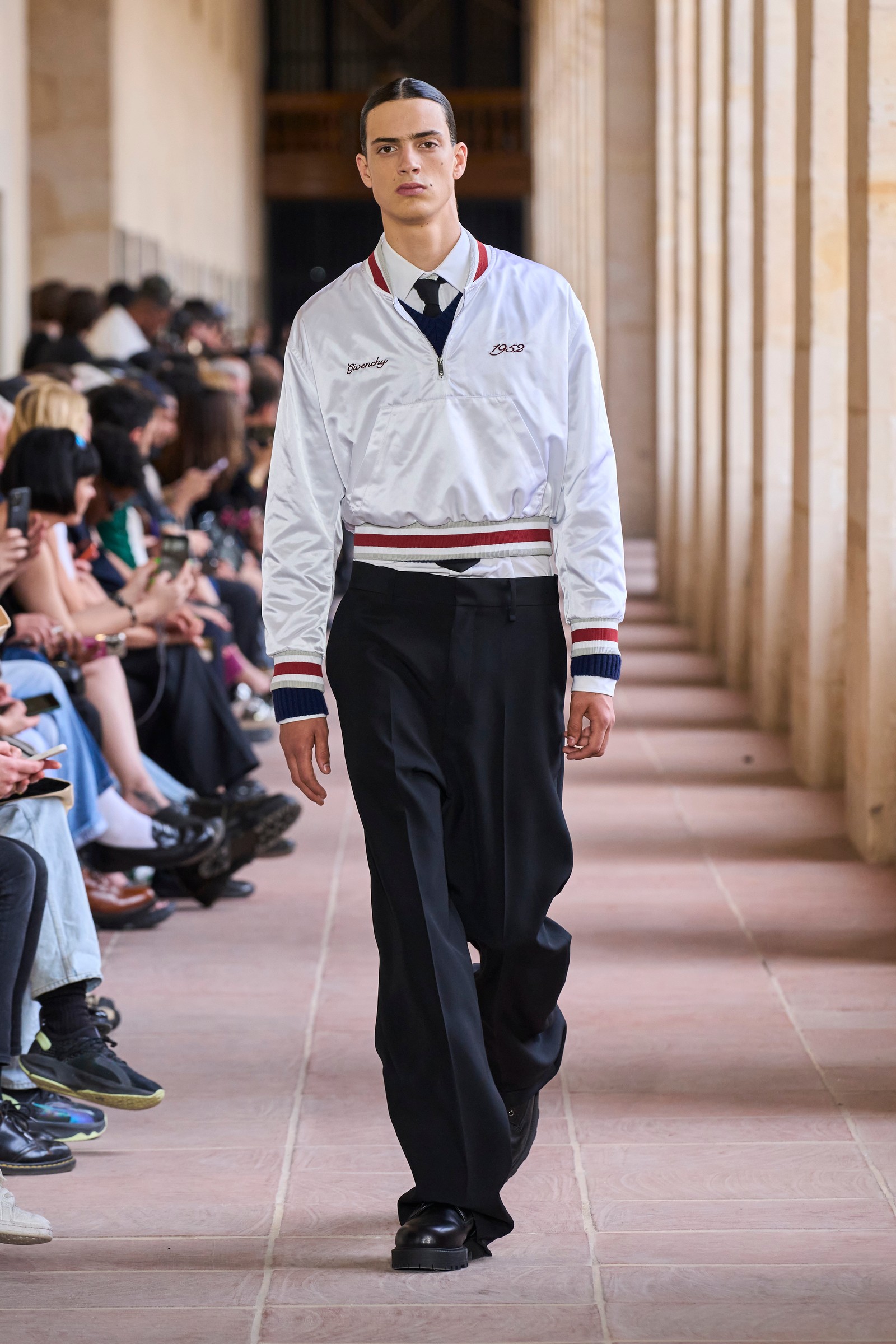
Givenchy
On the menswear of things, at least, Matthew M. Williams’ tenure at Givenchy each season, has generally come to be associated with a casual approach to luxury – a mainstay for men on the hunt for steezy sweatshirts and drippy denims. This season, though, seems to have marked something of an about-turn in the designer’s approach, with the collection he presented at Hotel National des Invalides leaning into high-brow sartorial, and easily ranking as his most sophisticated to date.
Opening with a suite of amply cut double-breasted jackets and shawl lapel tuxedos worn over wide silky trousers, the tone set from the start was one of exacting elegance, albeit totally void of stuffiness. Granted, this elegant turn is hardly a surprise from Matthew, whose tailoring – both at Givenchy and at 1017 ALYX 9SM – is widely lauded as some of the sharpest around. That was well proven by impeccably chic, long-lined sleeveless jumpsuits devoid of side seams, while generously proportioned wool greatcoats, front-pleated chino shorts and drop-crotch tailored trousers were imbued with an insouciant cool, making them feel intuitive, confidently-subdued developments on the capacious street-y fare that Givenchy menswear fans flock to the brand for. Those after something a little more conspicuous, though, will be pleased to see pieces like maxi-t-shirts with giant eyelets, techy corseted harnesses, and utility belt bags.
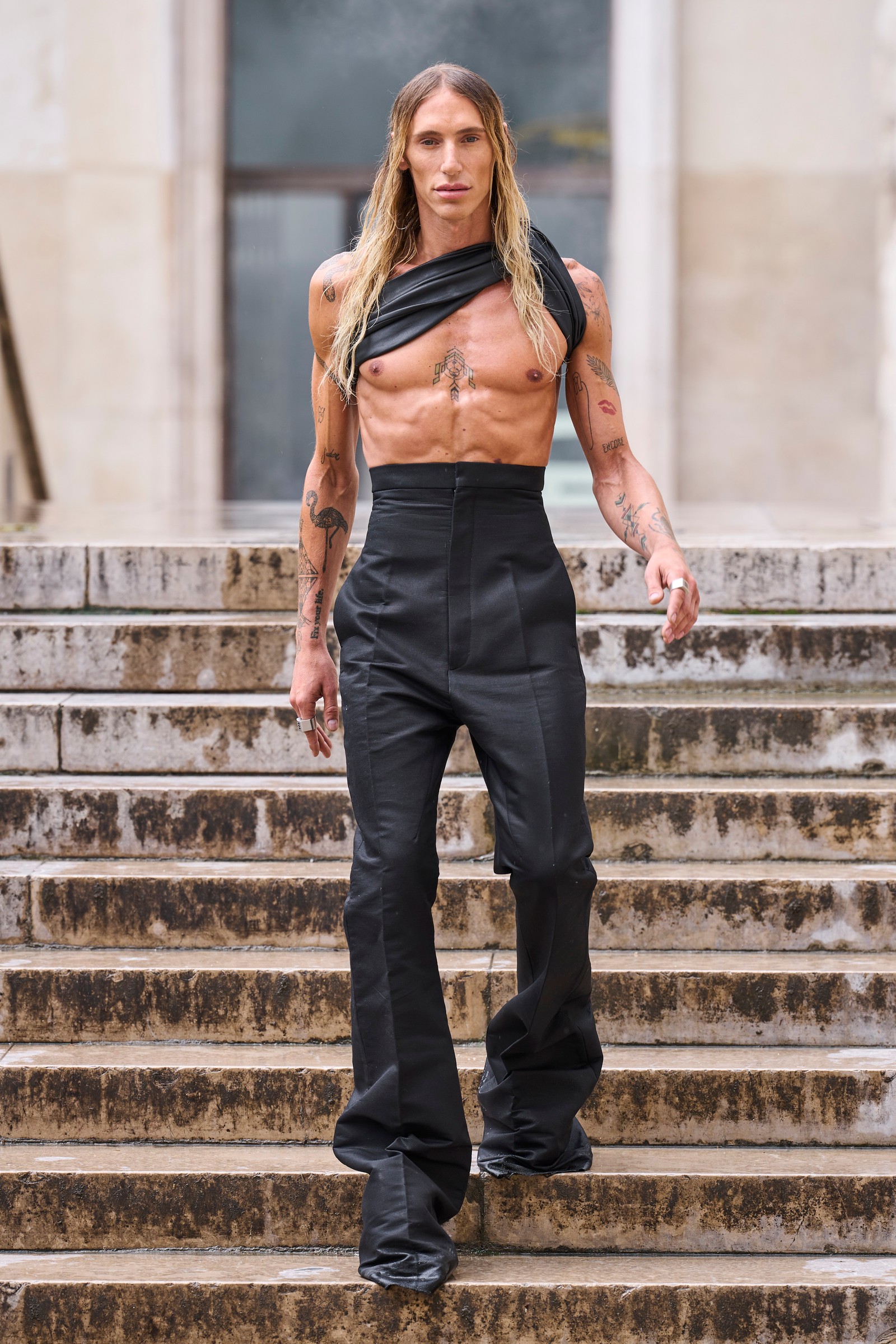
Rick Owens
For his SS24 menswear collection, ‘Lido’, named after the location of his home near Venice, Rick Owens proposed that darkness will soon fall. With an ominous and sombre energy, the first few looks began to cascade down the stairs at the Palais de Tokyo in Paris, featuring high, cinched waist trousers, so long and sweeping they fully cover the Kiss boots beneath. Done in wool and leather, they were paired with draped crop tops that aggressively twist around the torso – some in sleek, matching leather; others in airy sheers that suggested a hidden lightness – but all, remarkably, in rich shades of black. The only pops of colour in the collection, in fact, came from fireworks set off over the central pool that sent bright yellow, blue and pink smoke swirling into the sky, meant to signify moments of joy within the darkness.
“With our world conditions under increasing threat, jubilance seems like the wrong note but maybe it’s the only correct moral response? Beyond being nice to each other, isn’t personal joy what we are put on earth to do?” the designer asks in the show notes. “Considering joy a moral obligation, I propose a grim, determined elegance, all in a formal, restrained, albeit admittedly drama queen, black. How one handles adversity is what defines one’s character.”
And so, we march on. Elsewhere in the collection, this sentiment is expressed in leather gloved shrugs, that zip all the way up the seams, strict, structured jackets with jutted shoulders and skinny knit sleeves, mesh tops grounded by oversized cargo pockets and ‘light-as-a-feather’ jackets that float around the body, catching the smoke still hanging in the air. What’s interesting, though, is that despite the very real and threatening “world conditions” we face today, for Rick, it’s less about what one might wear to the end of the world, and more about the armour-like wardrobe – literal or metaphorical – required to triumph through it. In padded shoulder jackets, we see a devilish sense of resilience, because in his world even if we’re under threat, as the world has been since the dawn of time – humanity, and morality, will prevail and prosper.
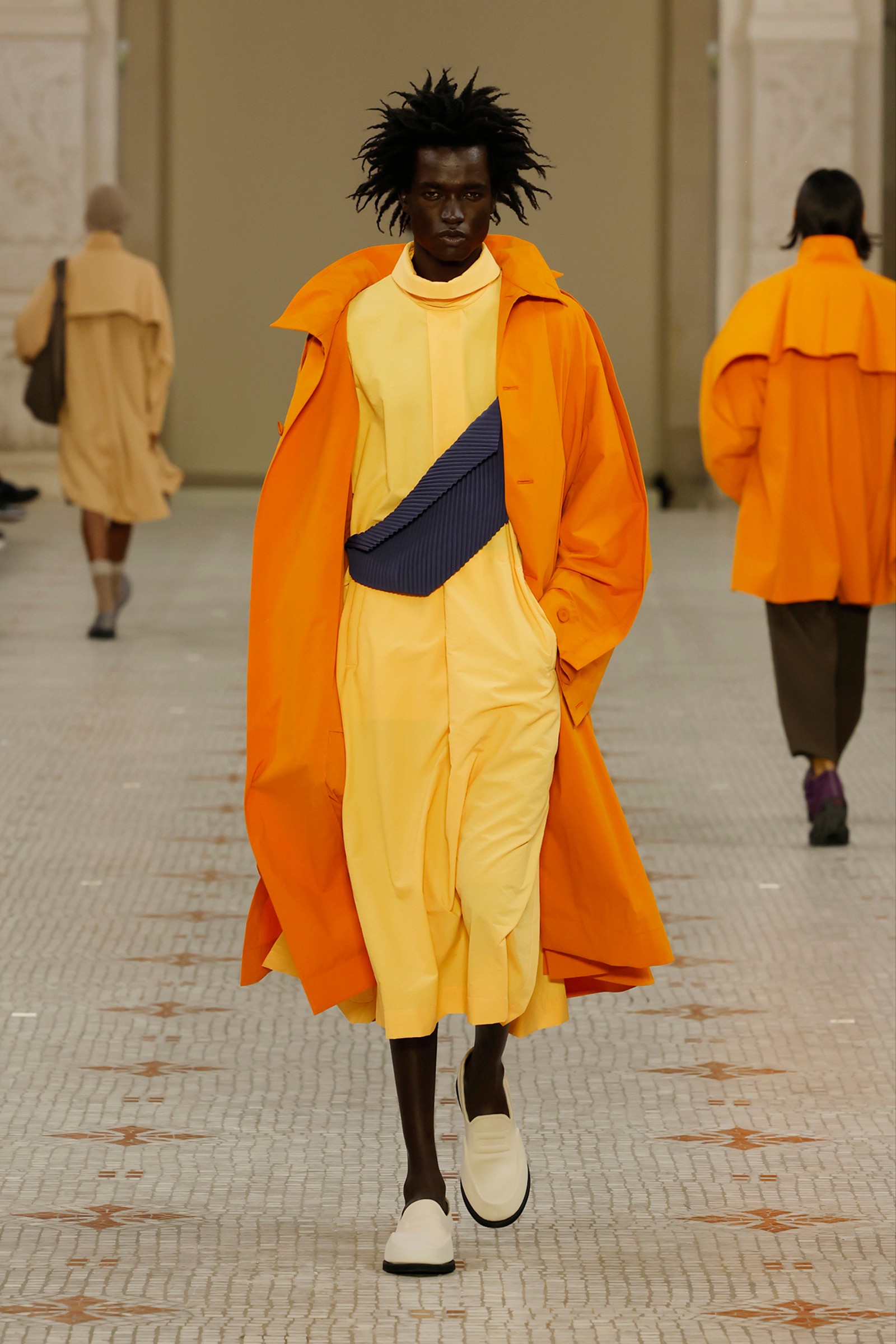
Issey Miyake
Upon entering the Musée des Arts Décoratifs in Paris, on a rainy Thursday morning, guests were greeted by pastel coloured T-shirts and tunics hung down from the ceiling in a perfectly askew clothesline. Look closely and you’ll see Issey Miyake’s signature pleats, of which the Japanese house’s SS24 menswear offering pays homage to in ‘Everyday, One of a Kind, Now and Hereafter’ – a collection centred upon refinement.
To drive it home, the design team opened the show by rolling out a large sheet of rice paper across the gallery floor, silhouettes that mirrored those above us emerging beneath its folds. At once, they began cutting away the layers to reveal the season’s separates – in soft shades meant to evoke the natural world; a light earthy green, seafoam, pale citron, baby pink – before dressing the models. Carefully setting their boxy shoulders and stretched waist bags, this look into the design, the making and the process of getting dressed, revealed the very potential of the finely pleated polyester, which was transformed into asymmetric ‘rectangle’ silhouettes and a new series of horizontally pleated garments. The latter, and the idea of changing the direction of the Homme Plissé pleats, made possible only by years of experience pushing the technology to its bounds, so that the garments can lightly bounce down the runway.
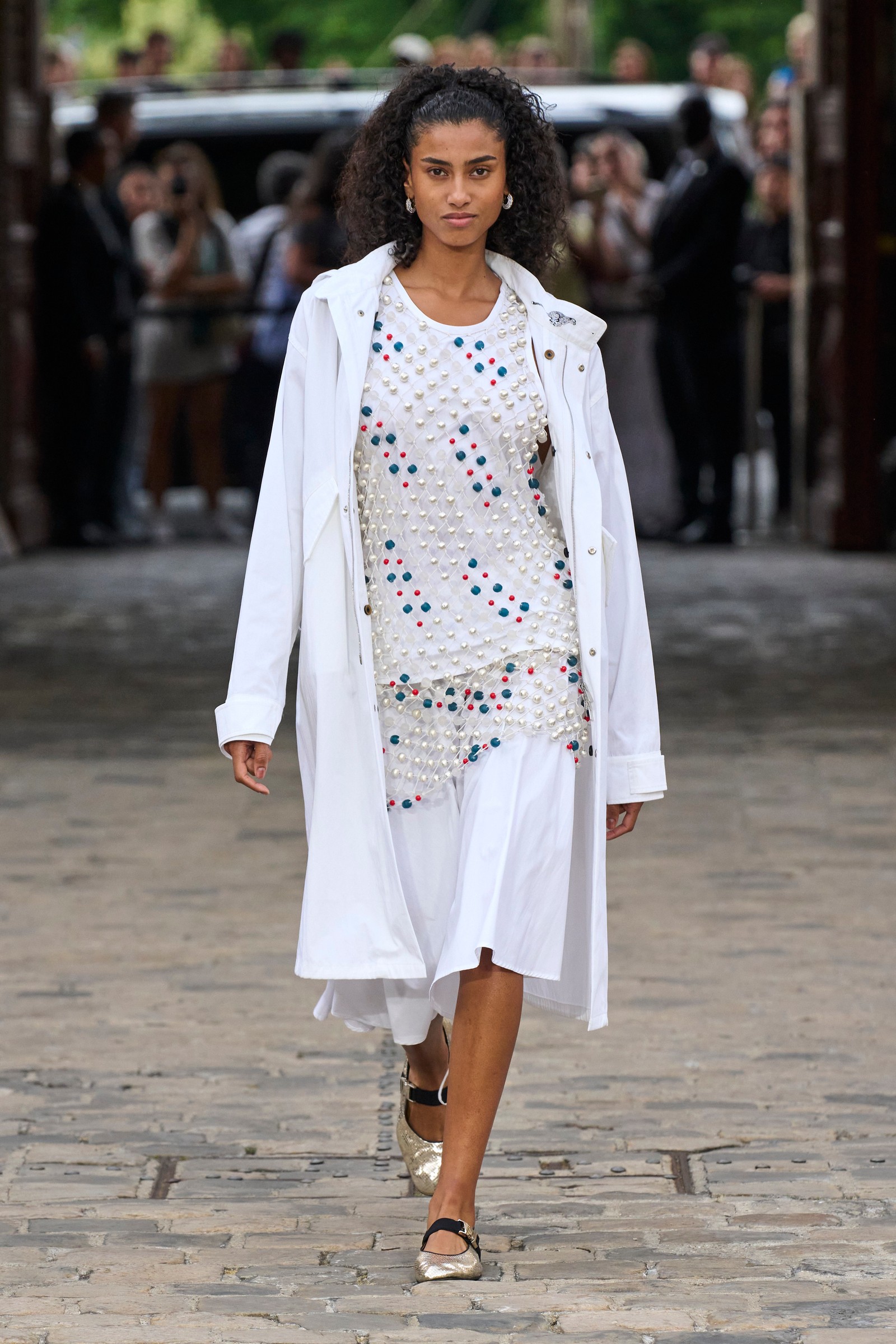
Wales Bonner
Although Grace Wales Bonner hasn’t completed a marathon, running an independent fashion business for almost a decade comes close to the sort of endurance training required to push through the most challenging roadblocks. What has been crucial to her success is an ongoing partnership with adidas Originals, which Grace has used to imbue the sentimental warmth of nostalgia into sportswear borrowed from legendary Black athletes. Her latest collection was titled ‘Marathon’, and perhaps her sportiest yet, inspired in part by Ethiopian long-distance runners like Yomif Kejelcha Atomsa and Tamirat Tola, both of whom walked the show in the courtyard of La Monnaie de Paris, the city’s museum of money. “It takes time it takes practice, repetition, and refinement,” explained Grace after the show of the show’s theme. “I draw a lot of inspiration from these runners. And I think that really aligns with my vision for Wales Bonner, it's like seeing the horizon and working towards it.”
This being Wales Bonner, however, there was also precision-cut tailoring, courtesy of another partnership with Savile Row’s Anderson & Sheppard. Somewhere between the dandyish tailoring and retro sportswear, Wales Bonner has hit its stride with collections that offer the the best of both: kurta-style tuxedo shirts, striped colour-block tracksuits, satin-lapels tailoring, Tibeb fabrics woven in Addis Ababa, alongside Italian-crafted silks, suedes and satins. There were some nods to the hallmarks of Africana, like leopard cowhide and some Masai chokers, alongside those of old-money Europe, like equestrian velvet-collard tweeds and tall leather boots. “I think it's just representing the different worlds and knowing how to function within those,” Grace said. “I like the sense of formality and I feel like with sportswear, I can be a bit more playful with colour and expression.” The combination of both, and a symbiotic development of formalwear infused with the ease of sportswear, and vice versa, is a winning formula for Wales Bonner.
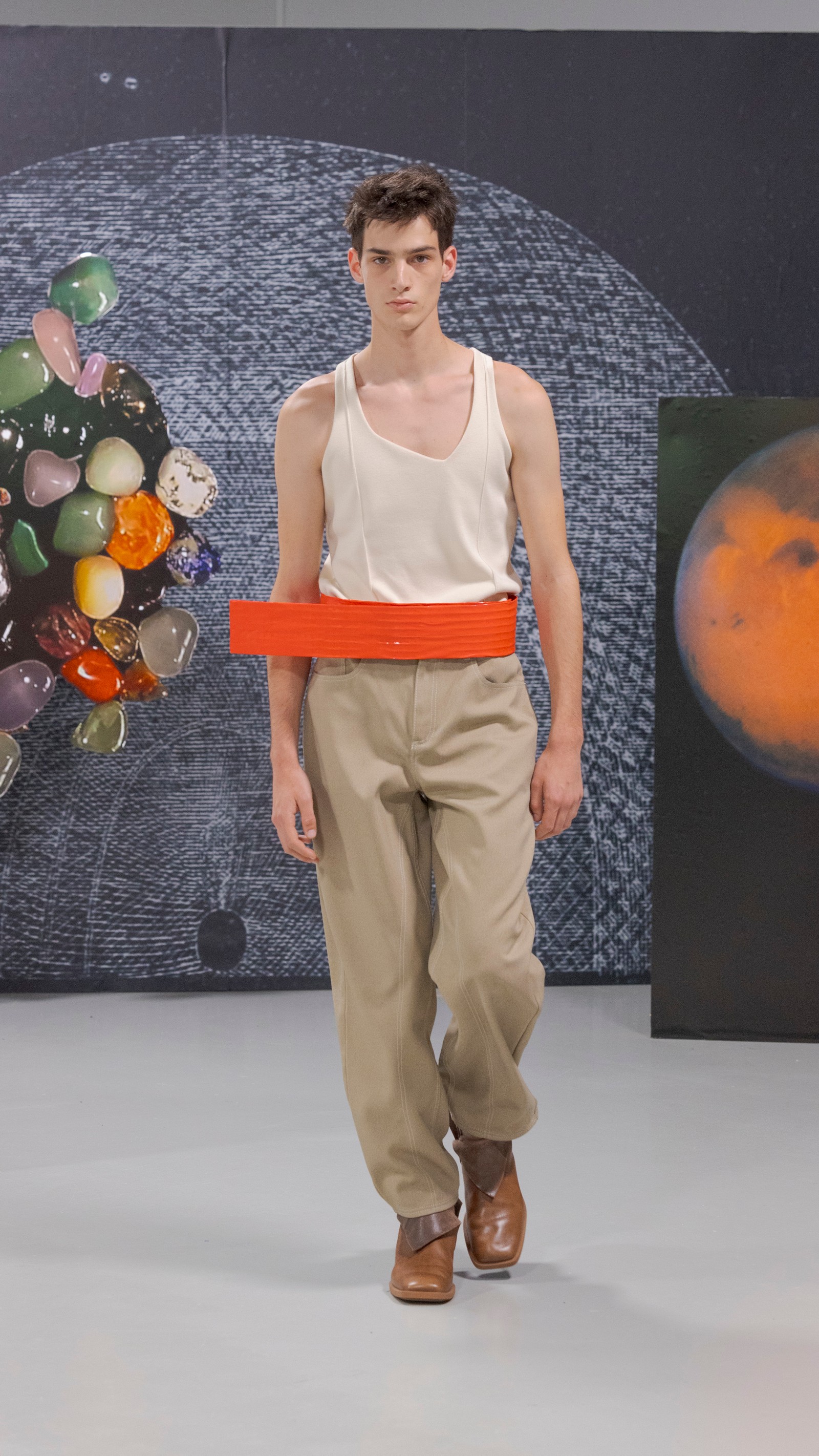
Bianca Saunders
The late Lee “Scratch” Perry is perhaps best known to the world as a pioneer in the musical genres of reggae and dub, but, as Bianca Saunders learned on attending a London exhibition, he was also an accomplished visual artist. Acclaimed for his scrapbook style collages, “steeped in religion, Jamaican iconography, animal motifs and mottos such as ‘good over evil’,” Bianca shares, his work served as the conceptual jumping-off point for the designer’s latest collection, a languid, brightly-hued men’s wardrobe-oriented offering.
Designed in collaboration with Farah – marking the second time she’s worked with Chris O’Brien, the brand’s Global Head of Design – the collection fused trippy insignias from Lee Perry’s archive alongside Bianca’s signature, cleverly-askew design motifs. Think: t-shirts with ruched side seams, asymmetrically fastened suiting and jumpers with slashed and reattached collars, banded with black duct tape. Trousers and jackets in Farah’s hopsack weave – a lightweight fabric that takes on the visual timbre of denim – brought a breezy, casual air to tailored pieces, while seemingly worn-in leather boots with foldover uppers – an extension of Bianca’s collaboration with Ecco as part of AT.Kollektive – grounded looks with a casual earthiness.
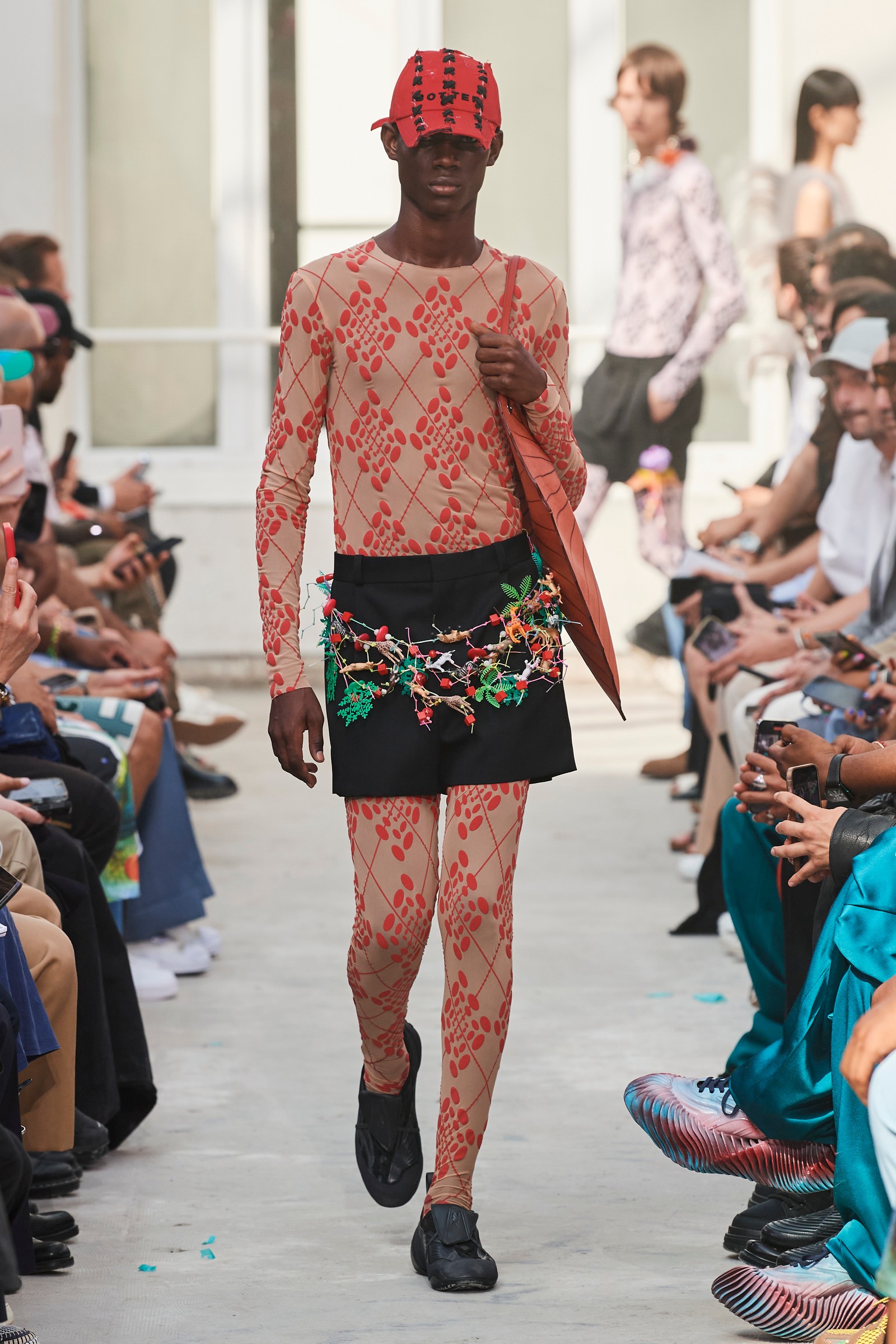
Botter
Opening the first full day of PFWM proceedings was Botter, who continued their nuanced exploration of the cultures of the Caribbean, from which its joint founders hail. This season’s focus was Haiti, specifically the rich spiritual customs associated with its native religion, Vodou. Born of the syncretism of religious traditions that arrived in the country – by way of the transatlantic slave trade and Catholicism imposed on the once-detained population by its French colonisers – Vodou is a spiritual artefact of creolisation, and a testament to the self-determined cultural identities that have developed in the post-colonial Caribbean.
Rather than dive into the nitty gritty details of the religion, though, Rushemy Botter and Lisi Herrebrugh drew inspiration from its inherent worldview, one that “everything within the universe affects everything else,” a release reads; that “the connection between the living and the spirits, the Earth, the land, and various bodies of water is important in all that work together to seek balance and to restore harmony and rhythm.” It’s an ethos that chimes with the approach they’ve taken to their work, using fashion as a means to both draw attention to the urgent plight of the world’s ocean, and also take direct action through sustainable textile innovations and education initiatives.
Echoing the “continuous flow of energy” that characterises Vodou, jackets were cut with front panels that twisted into Möbius-like knots, while gossamer, printed jumpsuits were imbued with a gentle, summery ease. Techy vests, pullovers and bags, seemingly composed of concentric plastic rings, were in fact upcycled Scooby Doo yarns. Meanwhile, more direct homages to Haitian culture and religious customs came in second skin lycra looks, decorated with intricate illustrations developed in collaboration with Haitian artist Day Brierre.
Where to begin with Pharrell’s debut menswear show for Louis Vuitton, the flagship luxury house of the world’s most powerful fashion conglomerate? I could start by telling you all about the clothes, but this show wasn’t really about the clothes. It was about power. This was a ceremonial exchange of it between the world’s richest family and one of the world’s most prolific artists; an exchange of dynastic, old-money-Europe and modern-day Black cultural capital; a meeting of hip-hop legends in monogrammed jackets and Parisian business tycoons in their navy suits. Pharrell is the latest addition to a stable of creative directors who define the look of the world’s most aspirational businesses. He has become the first musician-turned-designer at LVMH, bringing with him the kind of unparalleled cultural power that persuades Beyoncé to take a break from her world tour sit front row, Jay-Z to perform after the show, a heavily-pregnant Rihanna and A$AP Rocky to show up halfway through and perch alongside editors, and just about every other A-list celebrity to fly in and and fly the flag for fashion’s newly officiated marriage to the world of entertainment.


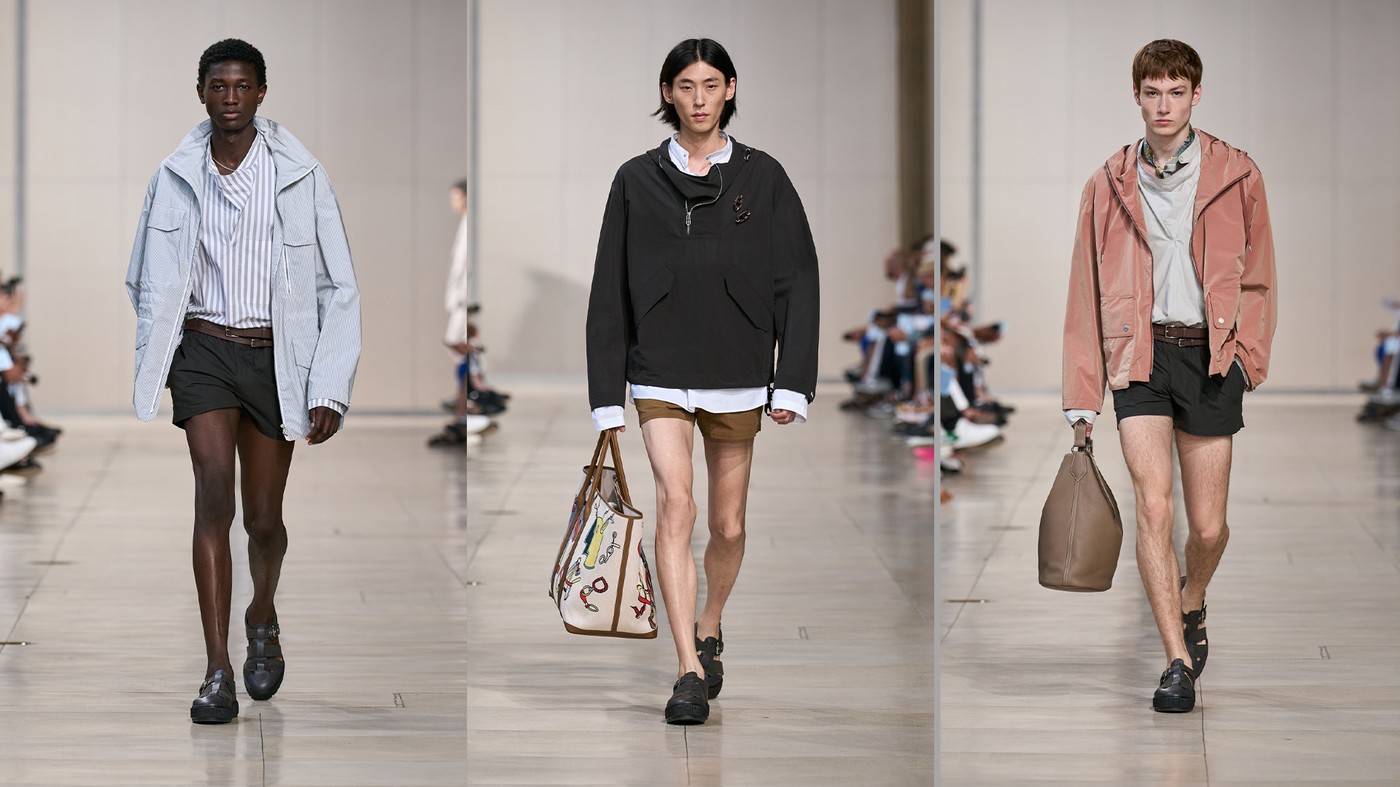
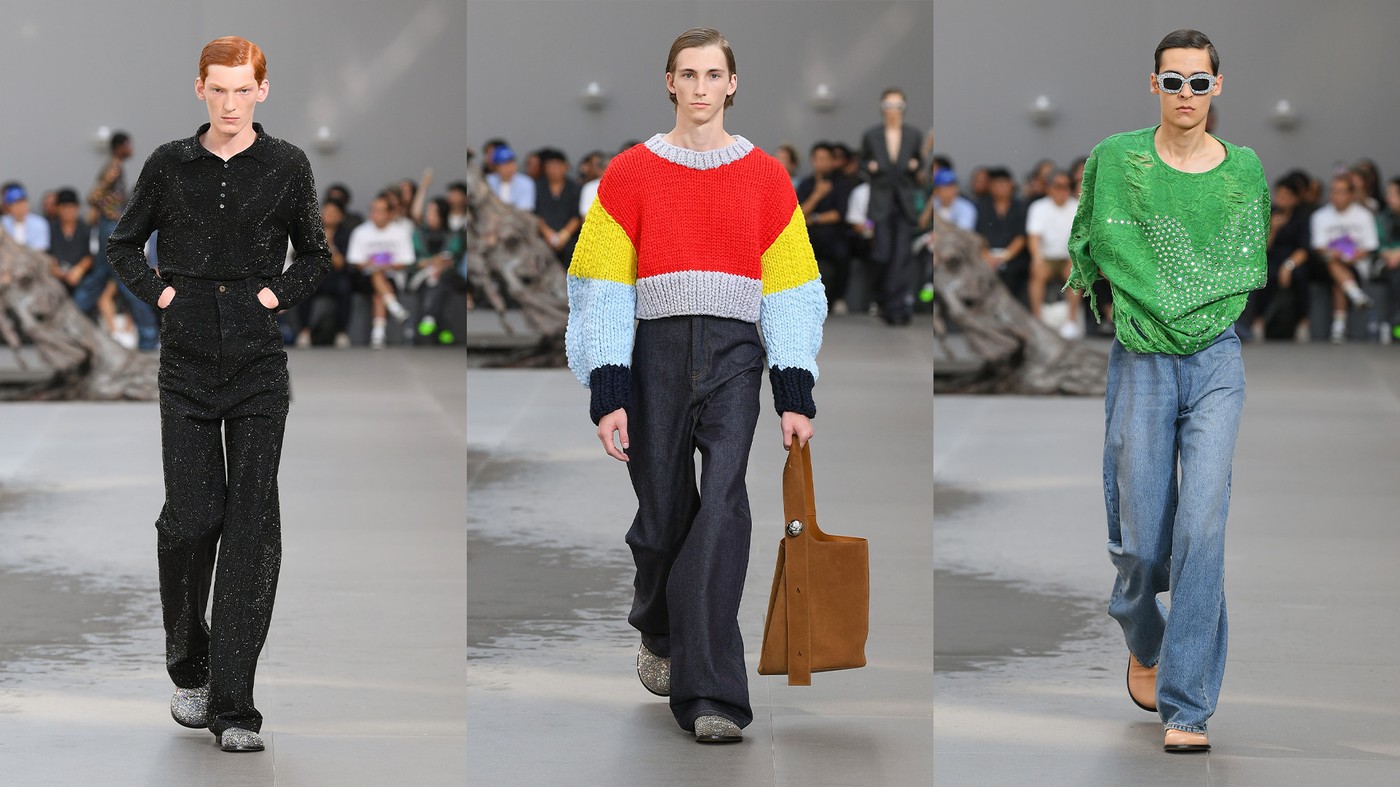
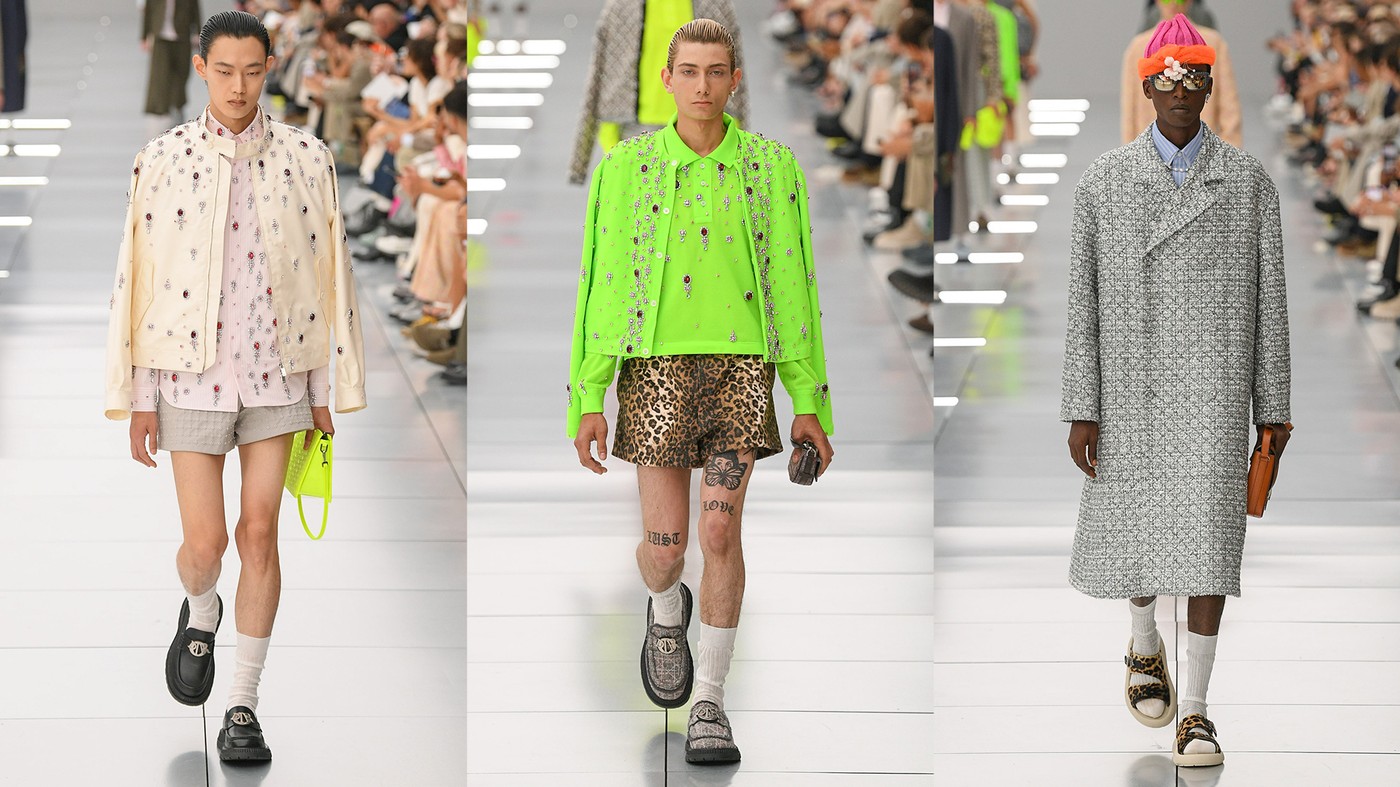
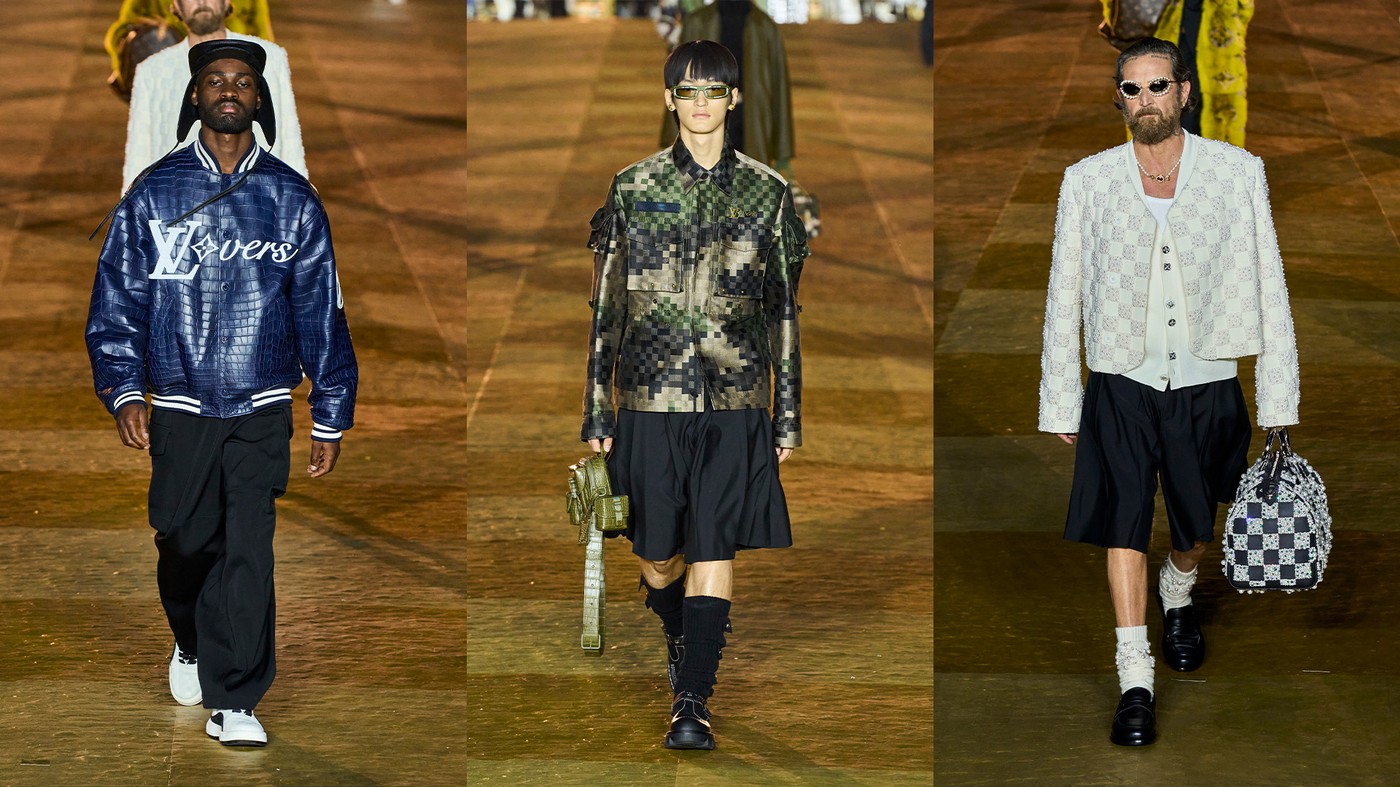
No comments:
Post a Comment